

40 Best Science Experiments & Projects for Middle School
Welcome to our curated collection of top science fair projects and experiments, perfectly tailored for the inquisitive middle schoolers. Our collection offers hands-on activities that will captivate young minds and ignite their passion for learning.
Science fairs during middle school years are less about competition and more about fostering a love for exploration, experimentation, and the thrill of the “Eureka!” moment. That’s why we have ensured that all the experiments on our list are fun and easy.
Through hands-on experimentation, students can gain a deeper understanding of scientific concepts, build confidence in their abilities, and cultivate a lifelong passion for learning.
1. Crushed Can
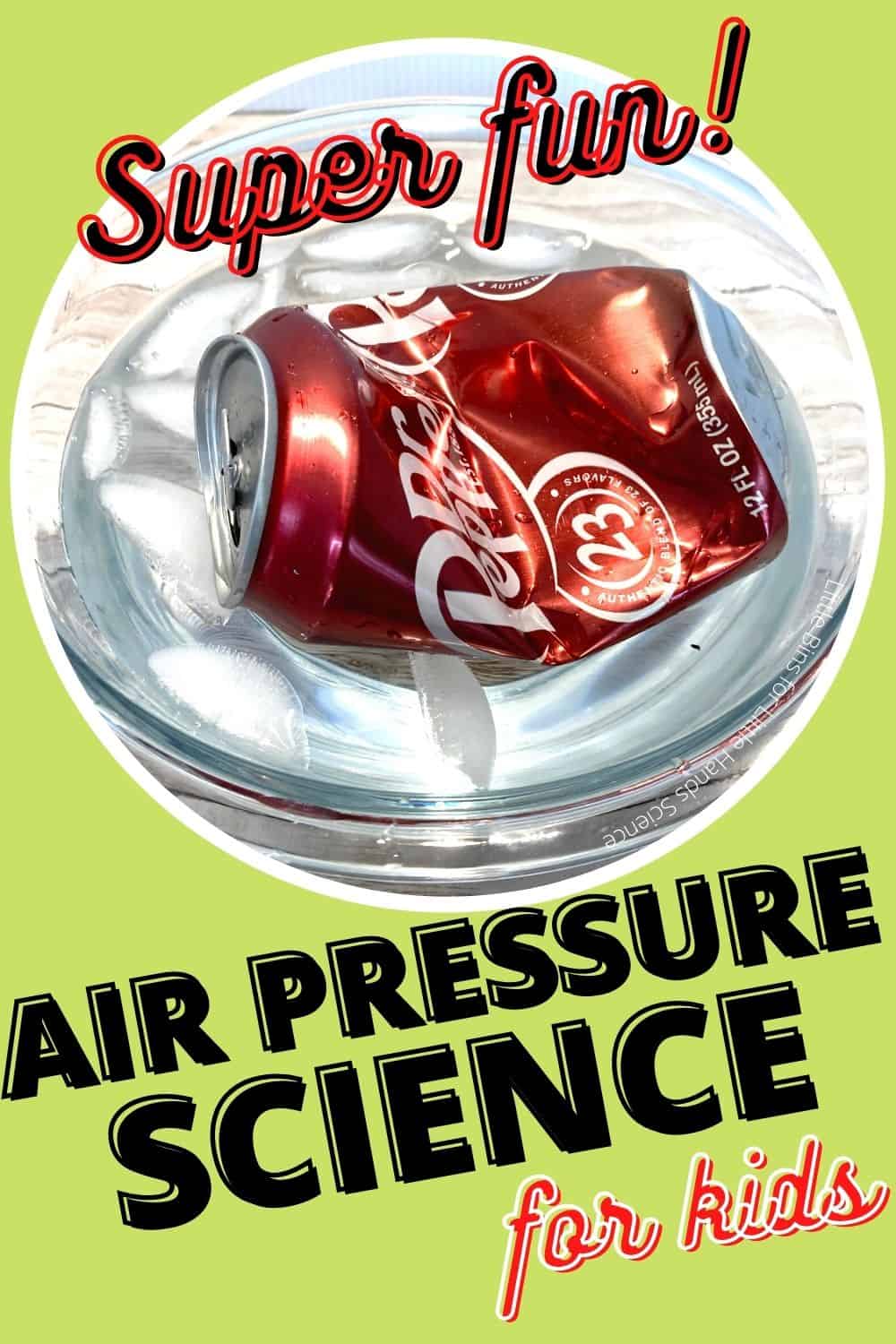
Students will be amazed as they witness an ordinary can being transformed before their very eyes. By simply heating it and then rapidly cooling it, the can will be crushed as if by magic!
Learn more: Little Bins Little Hands
2. Water Bottle Rockets
In this engaging activity, students will have the opportunity to design, build, and launch their very own water-propelled rockets.
By adjusting variables like water level and air pressure, they’ll witness firsthand how these factors impact the rocket’s flight path and distance.
3. Cabbage Ph Indicator
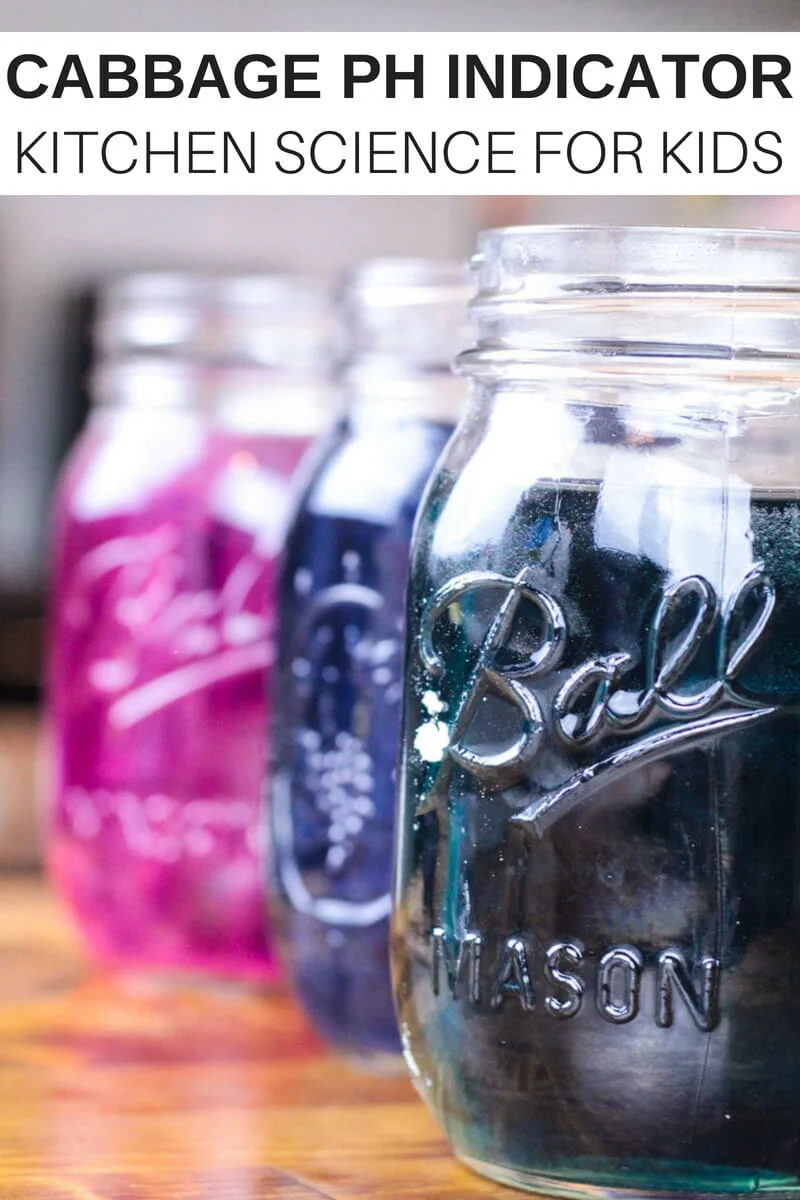
In this middle school science project, students will use red cabbage as a natural pH indicator to test the acidity or alkalinity of various household substances.
Learn more: Cabbage PH Indicator
4. Build a Solar Oven
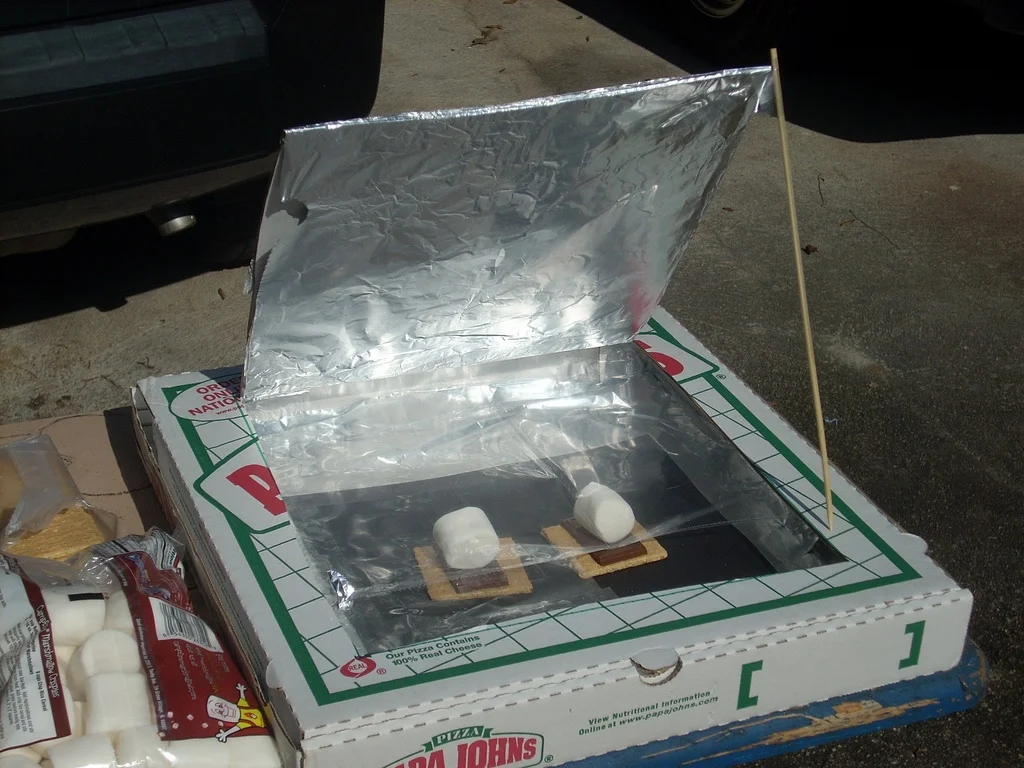
By building these ingenious devices using simple materials, they will discover the incredible potential of renewable energy and its practical applications in everyday life.
Learn more: Solar Oven
5. Build a Helping Hand
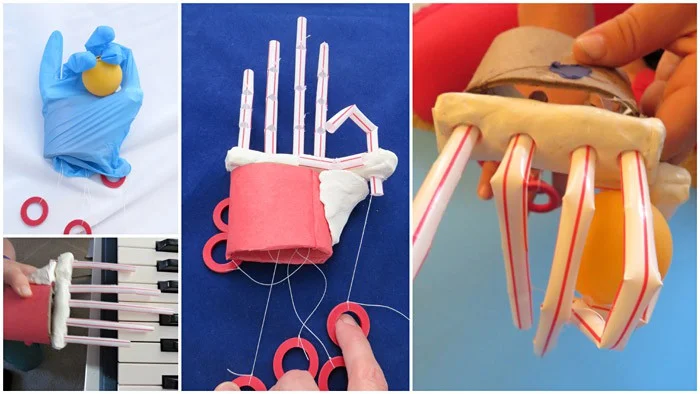
In this captivating middle school science experiment, students will have the opportunity to construct their very own “Helping Hand” device.
Learn more: Science Buddies
6. DIY Lung Model
This captivating middle school project offers an exciting hands-on opportunity to explore the inner workings of our respiratory system.
By creating their own lung models using simple household materials, students will gain a deeper understanding of how our lungs function and the vital role they play in our bodies.
7. Flying Tea Bag

By harnessing the power of convection currents, students will learn about the fascinating relationship between heat and air pressure.
Learn more: Flying Tea Bag
8. Egg Float Experiment
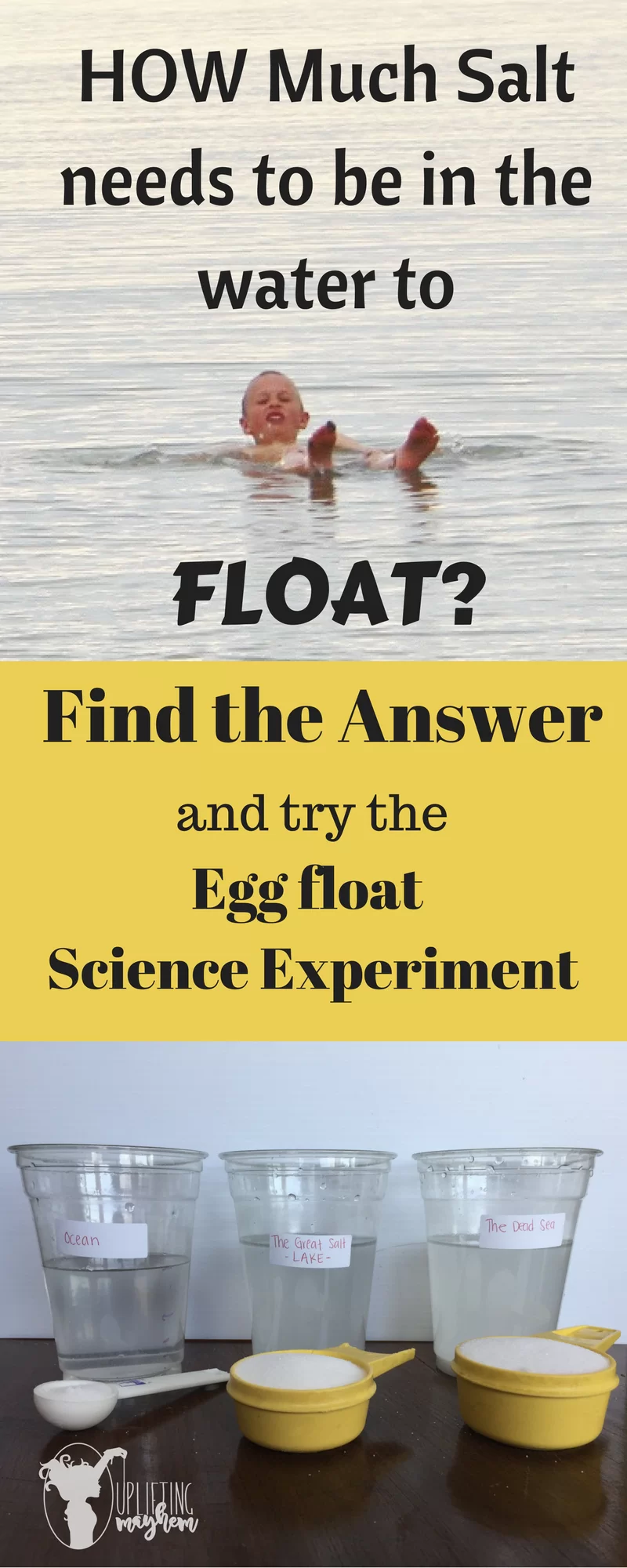
In this captivating middle school science project, students will unlock the mysteries of density and water displacement while discovering the fascinating properties of eggs.
Learn more: Egg Float Experiment
9. Popsicle Stick Chain Reaction
This captivating middle school project is all about the magic of potential energy and kinetic energy. By carefully setting up a series of interlinked popsicle sticks, students will create a mesmerizing chain reaction that ripples through the entire structure.
10. How to See Sound
As they watch sound come to life through colorful visualizations, students will develop a deeper appreciation for the profound impact of sound in our daily lives.
11. Orange Peel Plate Tectonics
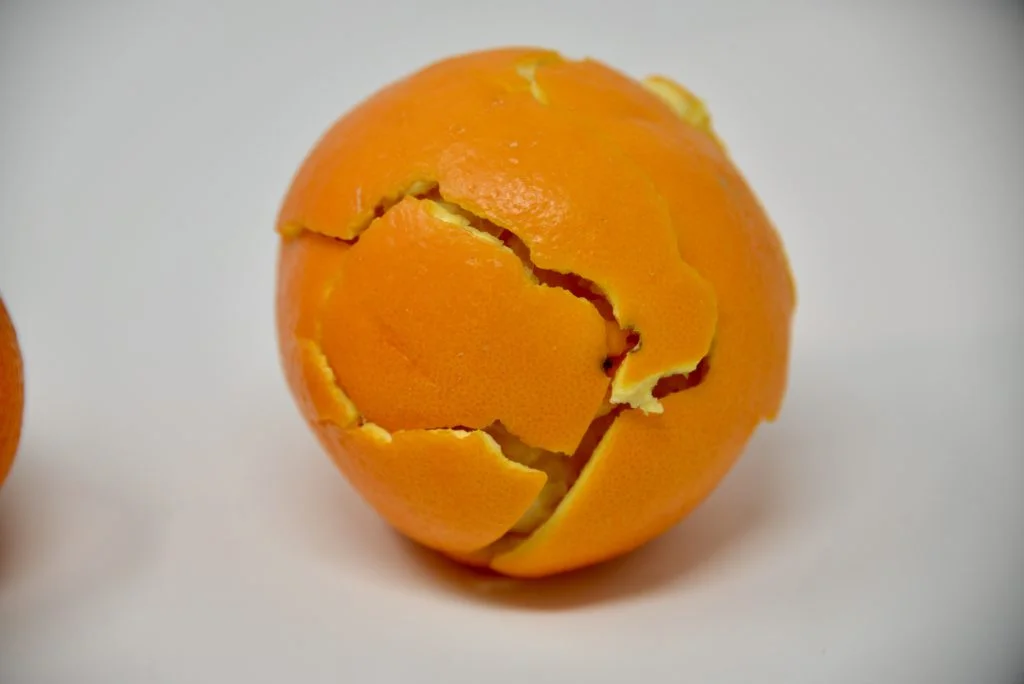
In this captivating middle school project, students will learn about the dynamic of Earth’s crust and explore the powerful forces that shape our planet’s surface.
12. Heart Pump
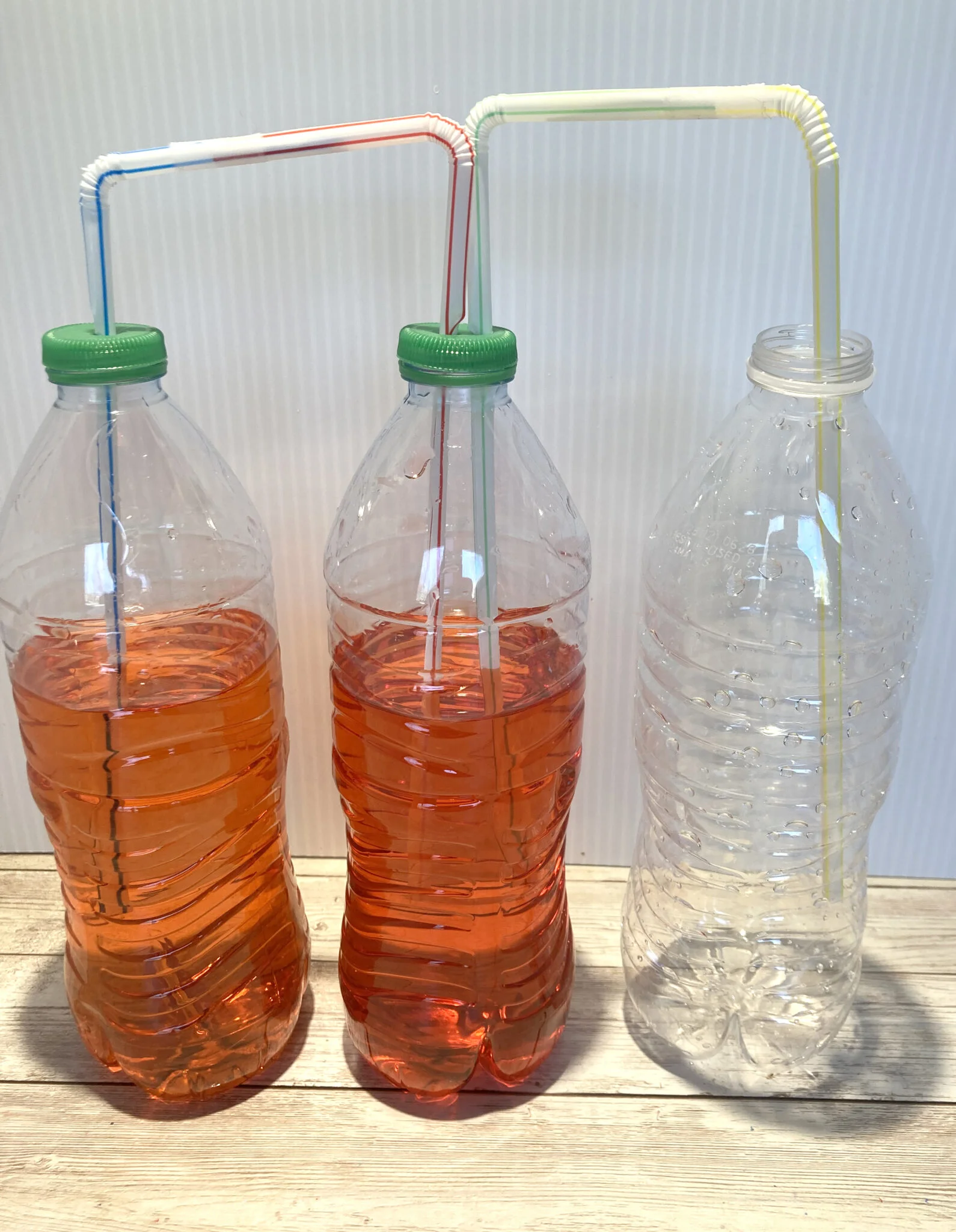
In this captivating middle school project, students will embark on a hands-on exploration of the human circulatory system and discover the marvels of the heart’s pumping mechanism.
Learn more: Heart Pump Model
13. Invisible Ink

By concocting their own invisible ink, students will discover the science behind chemical reactions and learn how certain substances react to reveal hidden text when exposed to heat, light, or other catalysts.
Learn more: Invisible Ink
14. DIY Grow Box
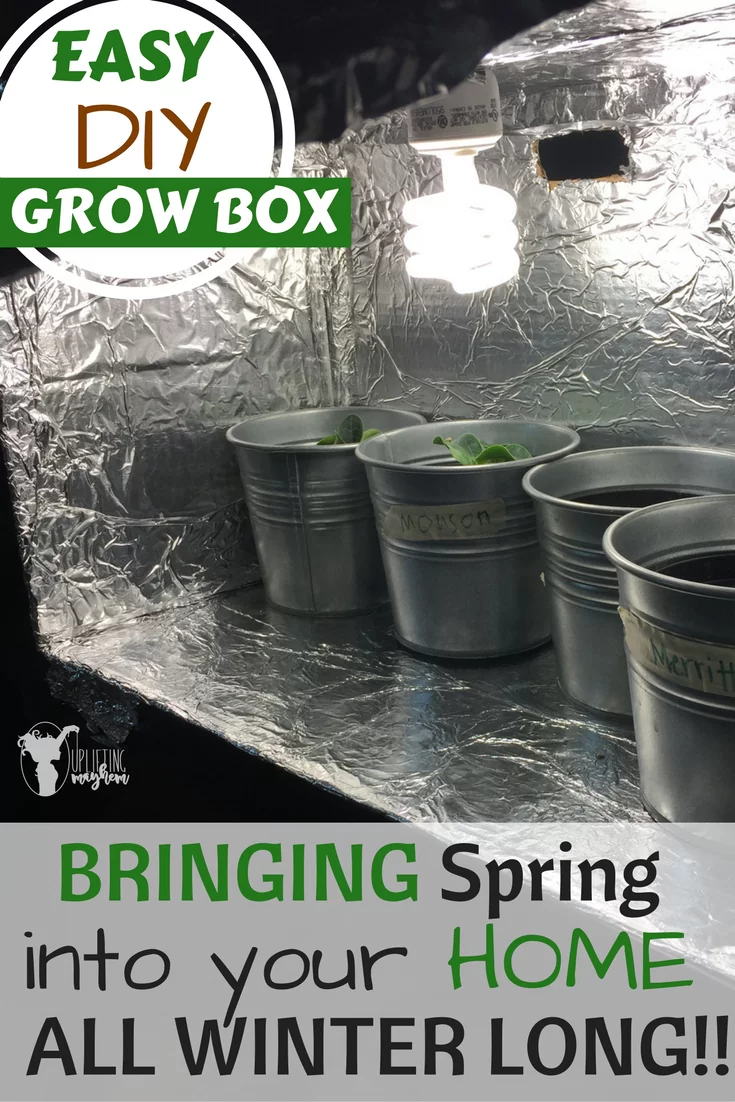
In this captivating middle school project, students will learn the wonders of plant growth and the art of nurturing a thriving garden.
By constructing their own affordable and innovative grow boxes using simple materials, they’ll have the perfect environment to observe the magical transformation from seeds to flourishing plants.
Learn more: Easy DIY Grow Box
15. Creative Ferris Wheel
By encouraging creativity and experimentation, this engaging experiment not only promises an exciting learning experience but also fosters teamwork and critical thinking
16. Alka Seltzer Rockets
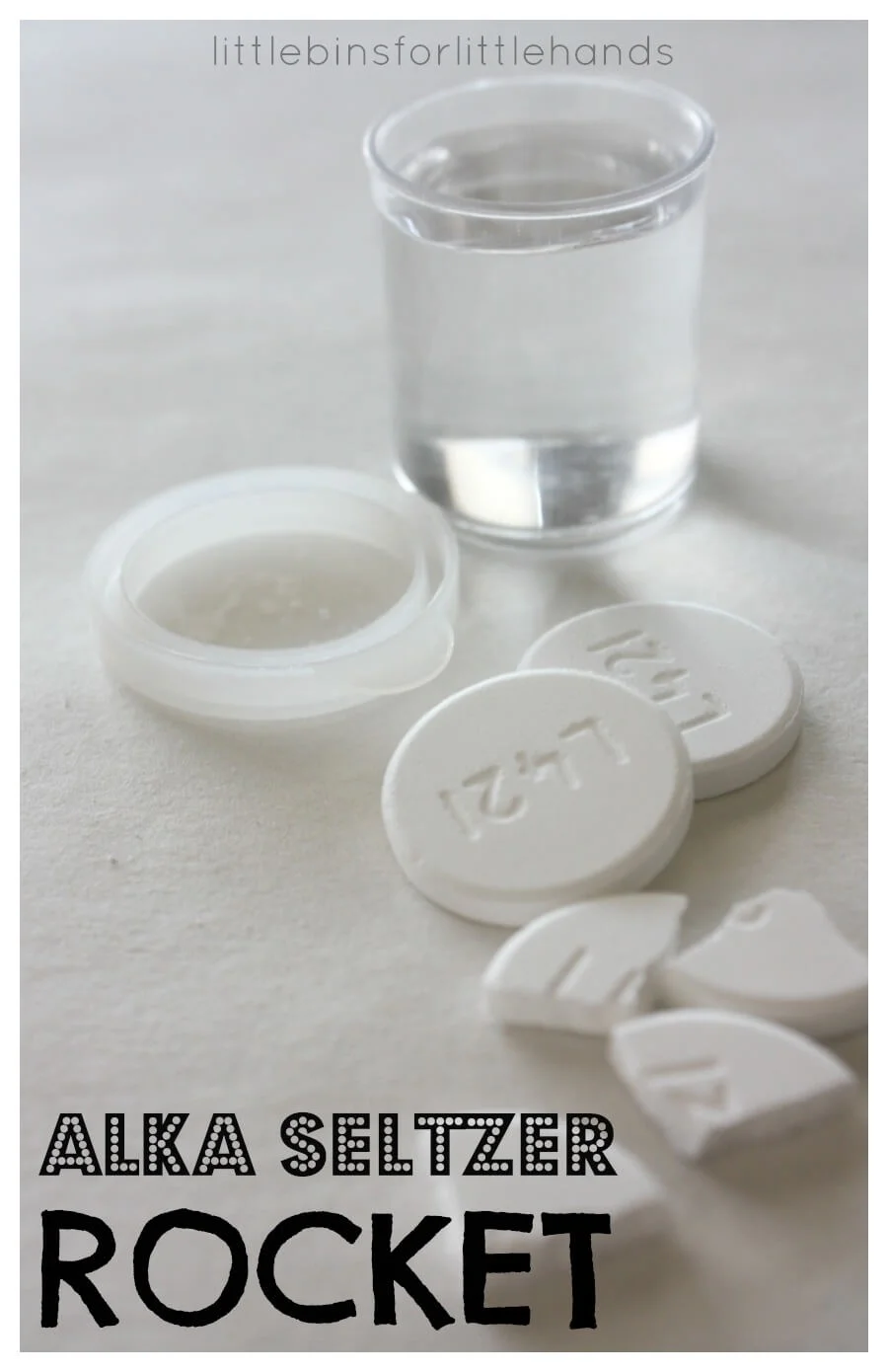
Prepare for a high-flying adventure with the Alka Seltzer Rockets science experiment! This exciting and explosive activity is a perfect choice for middle school students eager to explore the wonders of chemical reactions and rocketry.
17. Why do Apples Turn Brown?
Through hands-on exploration, middle school students will discover the role of enzymes and oxygen in this intriguing transformation.
18. Water Bending Experiment
By understanding the principles of surface tension and cohesion, you’ll be able to create mesmerizing effects, seemingly bending water with just a piece of static material.
19. Water Clock
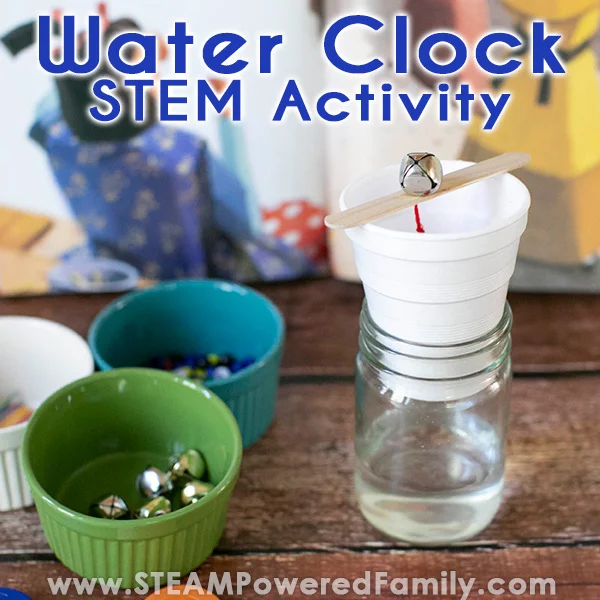
Experience the magic of timekeeping in its most ancient form with the fascinating Water Clock project! In this hands-on experiment, students will learn about history, physics, and engineering as they build their own timekeeping device using just water and a few simple materials.
Learn more: Steam Powered Family
20. Paper Ball Run Challenge
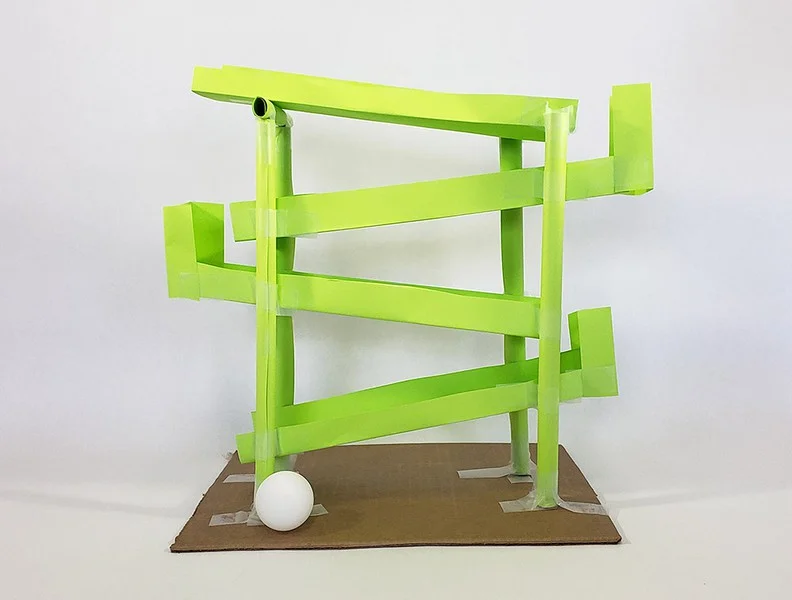
Get ready for a thrilling and creative adventure with the Paper Ball Run Challenge! In this captivating science experiment, you’ll explore the principles of motion, gravity, and engineering as you design and build your very own paper ball run.
21. Flood Barriers
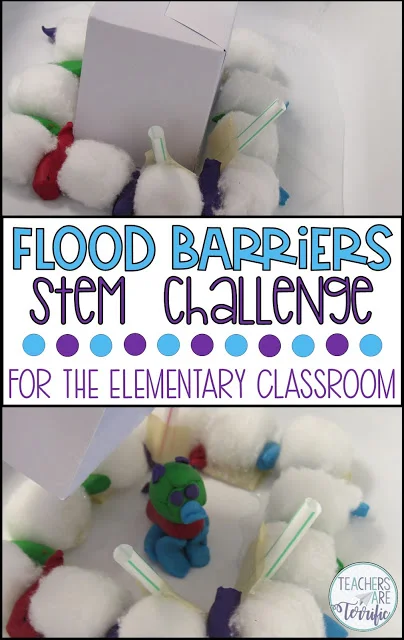
As you construct and evaluate your barriers, you’ll gain a deeper understanding of how floods occur and the importance of finding effective solutions.
Learn more: Teachers are terrific
22. Exploring the Law of Inertia Experiment Using a Fidget Spinner
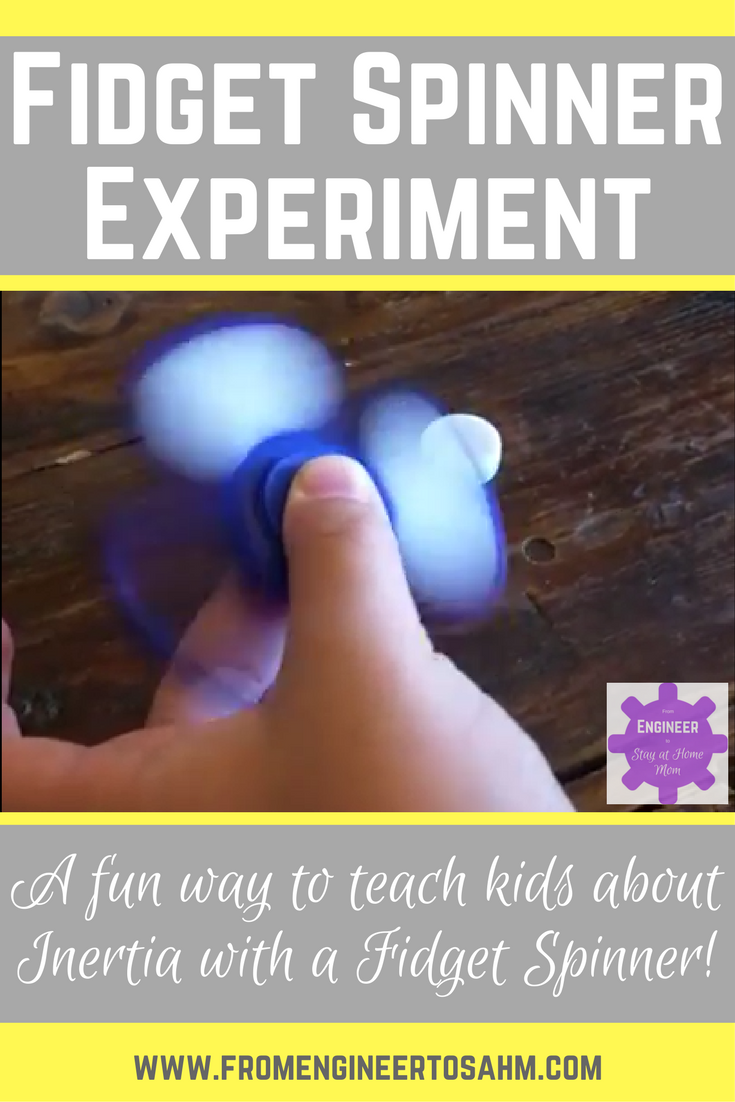
This engaging experiment will help you unravel Sir Isaac Newton’s Law of Inertia in a fun and hands-on way. By using a fidget spinner, you’ll explore how the spinning motion persists due to inertia and how different factors can influence its behavior.
23. Air Pressure Impact on Ping Pong Balls
By investigating the effects of air pressure on these lightweight spheres, you’ll uncover the secrets of flight, aerodynamics, and atmospheric pressure.
24. Rolling Uphill
In this experiment, you’ll witness the baffling phenomenon of a ball seemingly defying gravity by rolling uphill on a specially designed track.
25. Pick Up Ice with a String
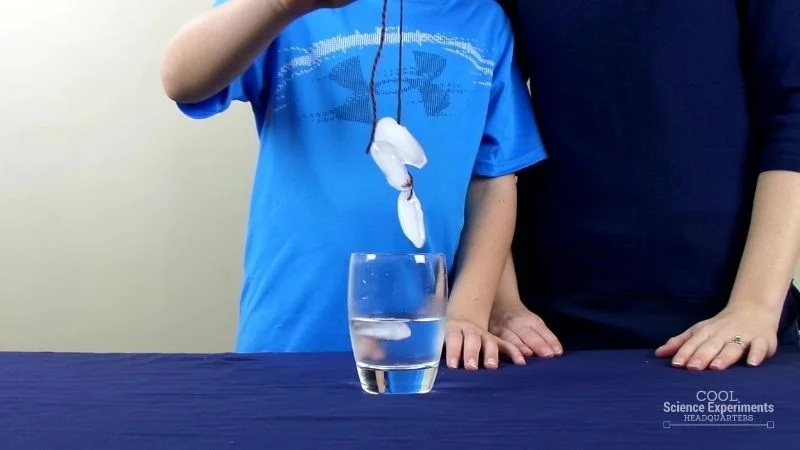
Have you ever wondered if it’s possible to lift ice using just a simple string? In this fascinating experiment, you’ll explore the principles of heat transfer and surface tension as you attempt to defy gravity and lift ice cubes with nothing but a string.
Learn more: Pick Up Ice with a String
26. Keep a Paper Towel Dry Under Water
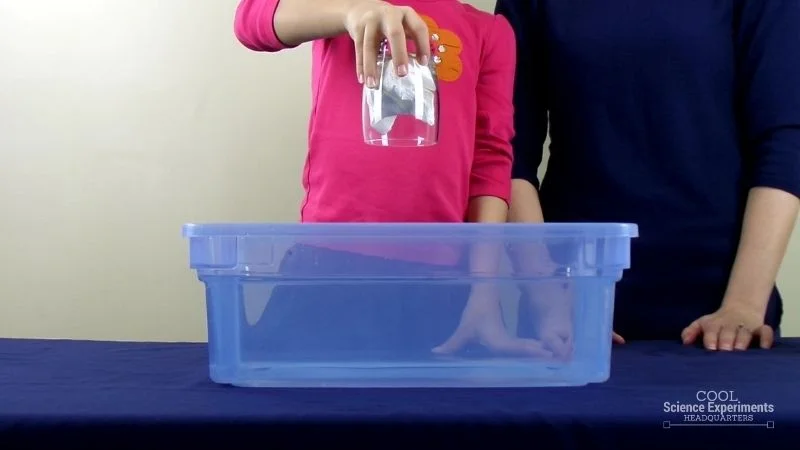
This captivating experiment will unveil the wonders of surface tension and hydrophobicity, as you attempt to create a barrier that defies the conventional wisdom of water soaking through paper.
Learn more: Keep a Paper Towel Dry Under Water
27. Upside Down Glass of Water
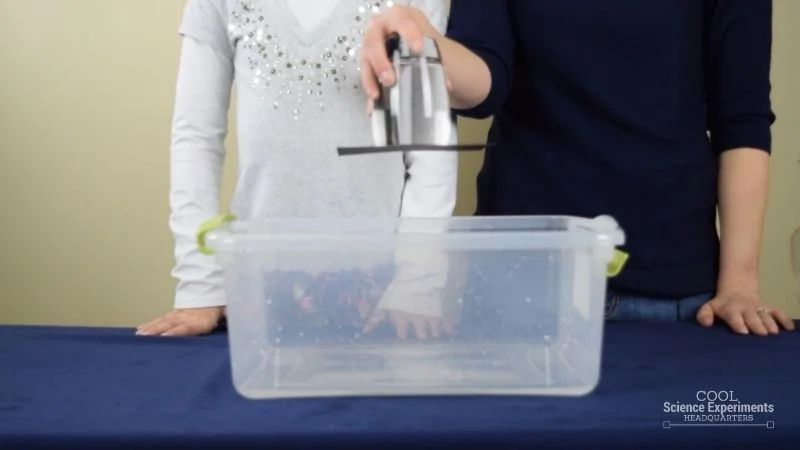
This mesmerizing experiment will unravel the fascinating concept of air pressure and its influence on liquids. As you turn a glass of water upside down and observe the water’s defiance of falling out, you’ll gain insight into the powerful role of air pressure in our everyday lives.
Learn more: Upside Down Glass of Water
28. Make a Wine Glass Sing
Have you ever wondered how to turn a simple glass of wine into a musical instrument? This captivating experiment will introduce you to the fascinating concept of acoustics and how sound waves interact with liquid-filled glasses.
29. Crush a Plastic Bottle
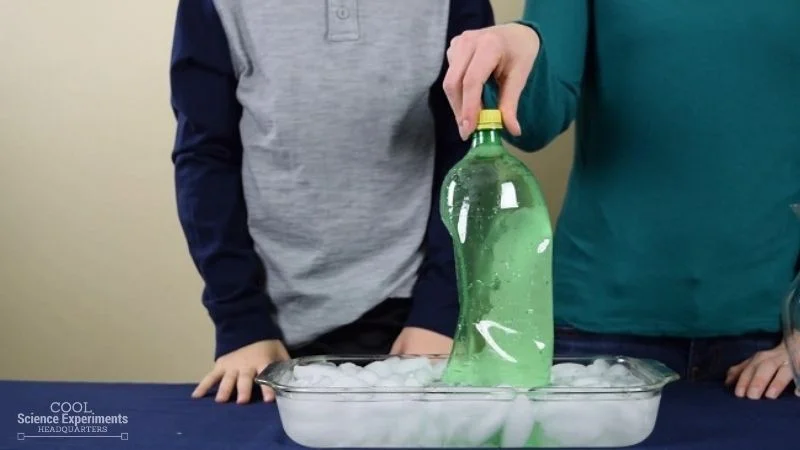
Are you curious about the forces at play when we compress a seemingly indestructible plastic bottle? This captivating experiment will unravel the science behind how pressure and air interact to create this astonishing effect.
Learn more: Crush a Plastic Bottle
30. Ruler Changes Size
Get ready to witness an optical illusion that will challenge your perception of reality. In this captivating experiment, you’ll explore the fascinating phenomenon of light refraction and how it can make objects appear different than they really are.
31. Egg in a Bottle
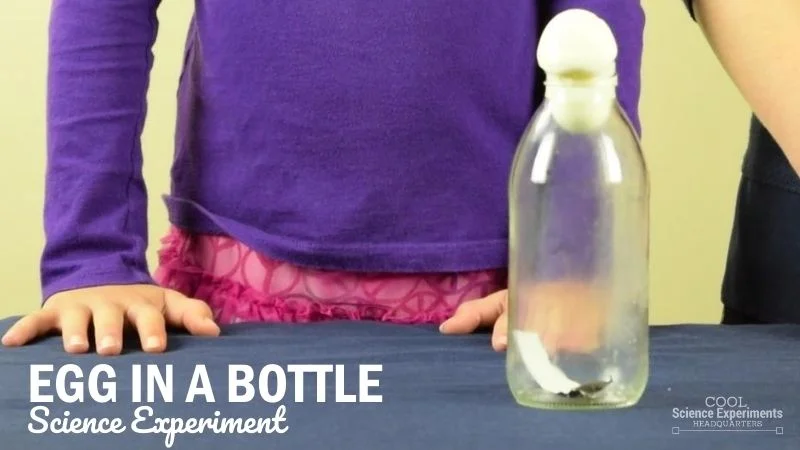
Have you ever wondered how to get an egg into a bottle without breaking it? This mesmerizing experiment will introduce you to the concept of air pressure and how it can be harnessed to achieve the impossible.
Learn more: Egg in a Bottle
32. Water Doesn’t Leak Out Science Experiment
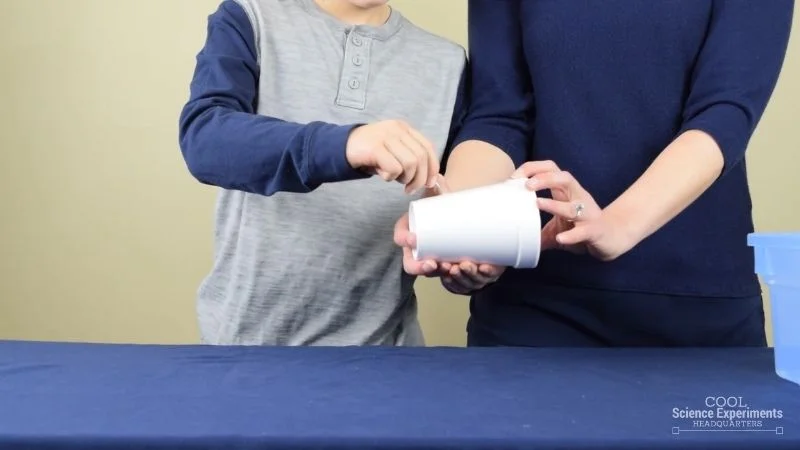
This hands-on activity not only sparks curiosity and amazement but also teaches you about the properties of gases and the laws of physics.
So, get ready to be astounded and dive into the magic of science with the “Water Doesn’t Leak Out” experiment – an entertaining and enlightening adventure that will leave you thirsting for more knowledge!
Learn more: Water Science Experiment
33. Pick Up a Ball with a Jar
This captivating experiment will introduce you to the fascinating concept of air pressure and how it can create a powerful force that defies gravity.
34. Glowing Water Science
This captivating experiment will introduce you to the fascinating properties of fluorescent materials and how they interact with light.
35. Fizzy Cloud Dough
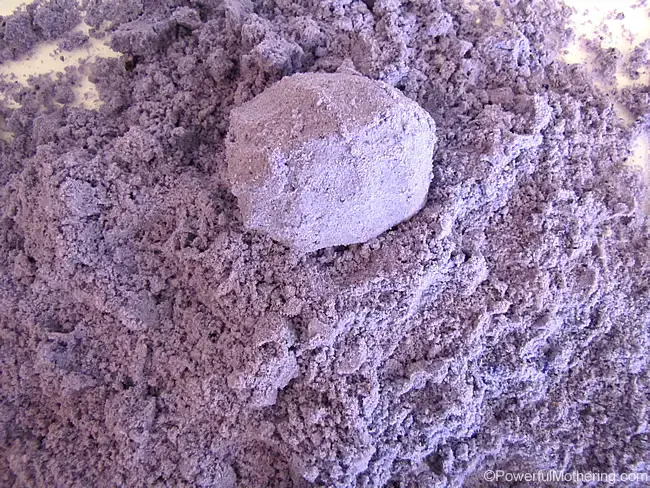
The fizzing reaction not only adds an element of excitement but also provides a great opportunity to explore the science of chemical reactions and the release of carbon dioxide.
Learn more: Fizzy Cloud Dough
36. Underwater Magic Sand
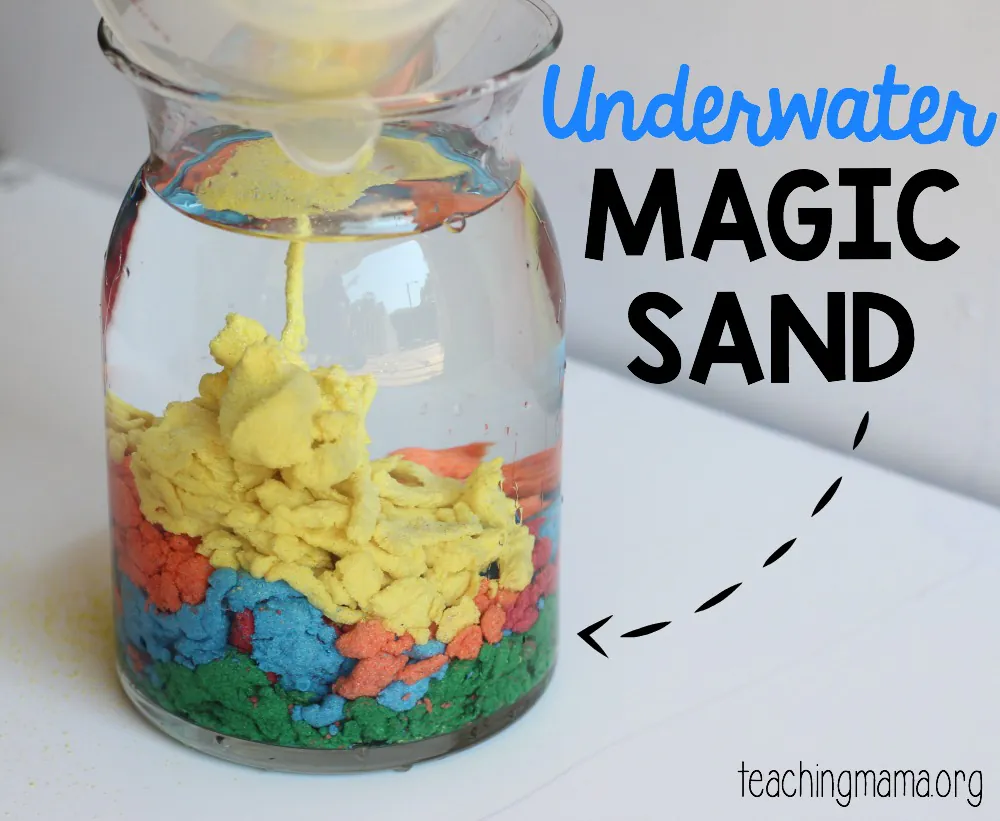
Get ready to witness the marvels of hydrophobic science and explore the secrets of this captivating underwater magic sand experiment.
Learn more: Teaching Mama Org
37. Make Bouncy Polymer Balls
This captivating experiment will take you on an exciting journey into the realm of polymers and chemical reactions.
38. Use a Crayon as a Candle

This hands-on activity not only sparks curiosity and excitement but also offers a safe and educational way to explore the science of combustion and the flammability of materials.
Learn more: Crayon Candle
39. Flame Test Colors

Not only does it spark curiosity and wonder but also deepens your understanding of the emission spectra of elements.
So, get ready to illuminate your scientific knowledge with the “Flame Test Colors” experiment – an educational and visually stunning adventure that will leave you dazzled and eager to discover more about the fascinating world of chemistry!
Learn more: Thought Co
40. Grow A Bean Plant
By planting a simple bean seed and providing it with water, sunlight, and care, you’ll witness the fascinating process of germination and watch as your bean seedling sprouts and grows.
Similar Posts:
- 68 Best Chemistry Experiments: Learn About Chemical Reactions
- 37 Water Science Experiments: Fun & Easy
- Top 100 Fine Motor Skills Activities for Toddlers and Preschoolers
Leave a Comment Cancel reply
Save my name and email in this browser for the next time I comment.
Middle School Science Fair Project Ideas
Jon Feingersh Photography Inc / Getty Images
- Projects & Experiments
- Chemical Laws
- Periodic Table
- Scientific Method
- Biochemistry
- Physical Chemistry
- Medical Chemistry
- Chemistry In Everyday Life
- Famous Chemists
- Activities for Kids
- Abbreviations & Acronyms
- Weather & Climate
- Ph.D., Biomedical Sciences, University of Tennessee at Knoxville
- B.A., Physics and Mathematics, Hastings College
Coming up with an idea for a middle school science fair project can be a challenge. There is fierce competition to find the coolest idea, and you need a topic considered appropriate for your educational level:
- Elementary School Projects
- Middle School Projects
- High School Projects
- College Projects
This is your chance to shine! Middle school students can do all right with projects that describe or model phenomena, but if you can answer a question or solve a problem, you will excel. Try to propose a hypothesis and test it. Aim for a typed presentation with visual aids, such as pictures or physical examples. Choose a project you can do fairly quickly to give you time to work on the report (no longer than a month). Schools may prohibit projects using hazardous chemicals or animals, so play it safe and avoid anything that might raise red flags with your teacher.
Science Fair Projects
Here are some examples of appropriate projects:
- Can you significantly affect your household water or electric bill (water or energy usage) by making a change in your or your family's behavior? For example, you might track changes you are making, such as taking shorter showers or turning off lights and record the utility usage.
- What household waste materials might be used to filter water? Examples of materials you might try include banana peels and coffee grounds.
- What materials glow under black light ? Can you use the UV light to find invisible, possibly smelly, stains in your carpet or elsewhere in your house?
- Will chilling an onion before cutting it keep you from crying ?
- Does catnip repel cockroaches better than DEET?
- What ratio of vinegar to baking soda produces the best chemical volcano eruption?
- What type of plastic wrap best prevents evaporation?
- What plastic wrap best prevents oxidation?
- What percentage of an orange is water?
- Are night insects attracted to lamps because of heat or light?
- Can you make Jell-O using fresh pineapples instead of canned pineapples?
- Do white candles burn at a different rate from colored candles?
- Does the presence of detergent in water affect plant growth?
- Can a saturated solution of sodium chloride dissolve Epsom salts?
- Does magnetism affect the growth of plants?
- How does the shape of an ice cube affect how quickly it melts?
- Do different brands of popcorn leave different amounts of unpopped kernels?
- How accurately do egg producers measure eggs?
- How do differences in surfaces affect the adhesion of tape?
- If you shake up different kinds or brands of soft drinks (e.g., carbonated), will they all spew the same amount?
- Are all potato chips equally greasy?
- Do the same types of mold grow on all types of bread?
- Does light affect the rate at which foods spoil?
- Can you use a household water filter to remove flavor or color from liquids?
- Does the power of a microwave affect how well it makes popcorn?
- Do all brands of diapers absorb the same amount of liquid? Does it matter what the liquid is (water as opposed to juice or... um.. urine)?
- Do all dishwashing detergents produce the same amount of bubbles? Clean the same number of dishes?
- Is the nutritional content of different brands of a vegetable (e.g., canned peas) the same?
- How permanent are permanent markers? What solvents (e.g., water, alcohol, vinegar, detergent solution) will remove the ink? Do different brands/types of markers produce the same results?
- Is laundry detergent as effective if you use less than the recommended amount? More?
- Do all hairsprays hold equally well? Equally long? Does the type of hair affect the results?
- What effect do additives have on crystals? You could add food coloring, flavorings, or other "impurities."
- What steps can you take to maximize crystal size? You can affect vibration, humidity, temperature, the rate of evaporation, purity of your growth medium, and time allowed for crystal growth.
- How do different factors affect seed germination? Factors that you could test include the intensity, duration, or type of light, the temperature, the amount of water, the presence/absence of certain chemicals, or the presence/absence of soil. You can look at the percentage of seeds that germinate or the rate at which seeds germinate.
- Is a seed affected by its size? Do seeds of different sizes have different germination rates or percentages? Does seed size affect the growth rate or final size of a plant?
- How does cold storage affect the germination of seeds? Factors you can control include the type of seeds, the length of storage, the temperature of storage, and other variables , such as light and humidity.
- What conditions affect the ripening of fruit? Look at ethylene, enclosing a fruit in a sealed bag, temperature, light, or nearness to other pieces of fruit.
- How are different soils affected by erosion? You can make your own wind or water and evaluate the effects on soil. If you have access to a very cold freezer, you can look at the effects of freeze-and-thaw cycles.
- How does the pH of soil relate to the pH of the water around the soil? You can make your own pH paper , test the pH of the soil, add water, then test the pH of the water. Are the two values the same? If not, is there a relationship between them?
- How close does a plant have to be to a pesticide for it to work? What factors influence the effectiveness of a pesticide (Rain? Light? Wind?)? How much can you dilute a pesticide while retaining its effectiveness? How effective are natural pest deterrents?
- Elementary School Science Fair Projects
- High School Science Fair Projects
- 8th Grade Science Fair Project Ideas
- Plant and Soil Chemistry Science Projects
- Chemistry Science Fair Project Ideas
- Examples of Independent and Dependent Variables
- Household Product Testing Science Fair Projects
- College Science Fair Projects
- 9th Grade Science Fair Projects
- 7th Grade Science Fair Projects
- Acid & Base Science Fair Project Ideas
- Environmental Science Fair Projects
- 6th Grade Science Fair Projects
- Grade School Science Fair Project Ideas
- Science Fair Experiment Ideas: Food and Cooking Chemistry
- Science Fair Project Ideas
Middle School Science Blog
Free lesson plans and resources for grades 5-8 by liz belasic (liz larosa), comparing surface temperatures.

- Infrared Thermometer
- 6 beakers each of sand, water, gravel (other items can be used, or more than 3 can be added)
- Meter Stick
- Handout with instructions, data collection, and questions ( Google Doc )
- Google Sheet for graphing ( Google Drive )
- Newsela Reading – Heat Islands & Questions ( Google Doc )
Directions :
Explore the campus on a sunny day and select both natural and manmade surfaces and record data. Enter data into spreadsheet – what patterns do you notice?
HW: Read newsela article and answer questions, discuss next class, how does this relate to our findings today?
Set up heat lamp experiment for a minimum of 25 minutes, make predictions, which surface will heat up the most? How hot will it get? What location (1-6)? Enter data and discuss results.
HW: Lab write up and discuss results next class
This was the first time I did this experiment, and seeing the results definitely had the ‘wow’ factor with my 6th graders, seeing the temps was actually surprising, esp for the rocks under the heat lamp. Many students thought the sand would be the hottest from their experience walking on hot sand at the beach in July/Aug. Also, the surface temp of the playground was surprising since it was a rubbery light colored composite and not dark colored asphalt. Prior to this activity, we took notes and discussed heat – radiation, convection, and conduction, and notes on sunlight and how it causes the seasons and different climates on Earth. Under the heat lamp, position 1 was analogous to being at the equator while position 6 was at the poles. The Google Sheets will automatically graph your results once the data is entered.
If you use this activity, would love to see your results!
Share this:
- Click to share on Pinterest (Opens in new window)
- Click to share on Twitter (Opens in new window)
- Click to share on Facebook (Opens in new window)
- Click to share on Tumblr (Opens in new window)
- Click to email a link to a friend (Opens in new window)
- Click to print (Opens in new window)
- Click to share on Reddit (Opens in new window)
- Click to share on Pocket (Opens in new window)
Notorious B.U.G.s

Notorious B.U.G.s Research and Poster
As part of our entomology unit, students choose an insect that negatively impacts humans in at least one area of our daily lives: agriculture & horticulture, disease, economic hardship or nuisance.
Using Google Classroom, each student receives a blank Google Draw document and has artistic freedom to design their poster as long as the research requirements are met. I am able to check their work and add comments/corrections as they are doing their research and give real time feedback.
This is the handout with the requirements and for fun, we usually do a draft pick format to select insects.
Volume of a Penny Lab – New!
This slideshow requires JavaScript.
Problem: How can we use water displacement to calculate the volume of one penny?
- Volume of a Penny Lab (PDF)
- Graduated cylinders (25 mL, 50 mL, or 100 mL)
- Cup or beaker of water, food coloring optional
- Pennies – 100+ per group
- Plastic Spoon – to pour water out of graduated cylinder and separate pennies

This is a simple & fun lab to have students practice measuring and reading volume as well as use water displacement to determine the volume of a penny – an irregularly shaped object.
Students will design their own series of 10 tests with the following criteria:
- All pennies must be under water inside of the graduated cylinder.
- The volume of water must not pass the 100 mL (or highest) increment.
- All data is recorded carefully.
Students were able to carefully measure and determine that the volume of a penny was 0.35 mL – most students were very close with a range of 0.33 – 0.37 mL.
https://www.instagram.com/peckscience/
Back to School: Group Ice Breakers
Ask/Answer/Trade: FREE Google Slides
On the first day of school as part of our advisory period, we gather the 6th graders together (about 40 students) and take them outside to do this ice breaker as a whole class. The 5 advisors model how to do this activity and then we hand each student a card and allow them to mingle and mix for about 10-15 minutes.
Strike a Pose
I am not really sure what the name of this activity is, so I just call it “strike a pose” – if you know what it is, please let me know in the comments so I can update it 🙂
This is also a really fun large group activity where the kids get to run around outside and make different poses. Start off with everyone just mingling around, and then you call out a “pose” for them to strike. When starting this activity, use multiples that total the number of students you have so that no one is left out in the first few rounds. For example, it you have 40 students, you can do poses that need a pair of students, a group of 4, a group of 5, etc. Then, after a few rounds, you pick a number that does not fit evenly. Mix up the groupings randomly, they have to figure out how many people to complete the pose. The students that don’t pair up with someone, will then sit out. You can keep going until you have a handful of students left or restart at any time. This is really fun and the kids will grab anyone near them to complete the pose!
Examples of Poses:
- Single: Statue of Liberty, Michael Jackson, Spider Man, Hulk, a bowler
- Duos: Batman & Robin, Sonny & Cher, Tennis Partners, Woody & Buzz
- Trios : Charlie’s Angels, Nirvana, Jonas Brothers, Three Musketeers
- Group of 4: Beatles, Fantastic 4, Ghost Busters, Teenage Mutant Ninja Turtles
- Group of 5: Basketball team, The Incredibles, Jackson 5,
- Group of 6: Brady Bunch, Volleyball Team, Cast of “Friends”
- Group of 9: Baseball /SoftballTeam
- Everyone – class of 20XX
Please add additional ice breakers in the comment section!
Cabbage Juice – Quick & Easy Set Up

Quick & easy – no fuss – no mess – way to prepare cabbage juice:
- Chop up half of a purple cabbage
- Add to a coffee pot
- Fill with very hot water from sink or water cooler
- Let it sit for at least 20 minutes
- Pour into flasks, beakers, or plastic cups
- Add a pipette or spoon to containers
You can add more hot water during the day as you use it, refrigerate leftovers if using next day.
Here is the link to my Cabbage Juice Lab: https://middleschoolscience.com/2016/02/28/cabbage-juice-lab-ph-indicator/
Penny Boat Challenge

- Rules & Jobs for the challenge ( Google Doc )
- Google Sheets to keep track of results
- 15 x 15 cm for prototypes
- 30 x 30 cm for competition
- 2 or more large storage tubs filled with water
- tub for ‘boat graveyard’
- towels – at least 8+
- box of pennies – 5,000+
- cups to hold pennies

Comparing Mitosis & Meiosis Resources
- Intro to Meiosis: 7LL Google Slides Public
- Intro to Meiosis: 7LL Guided Notes Public Link
- Mitosis vs Meiosis 7LL Cheat Sheet, Fill in the Blank, & Cut & Paste Review Activity Public Link
- CK12: Meiosis Resources
Amoeba Sisters Videos:
DNA, RNA, & Crime, Oh My! (Modified Snorks Activity)
This is a fun and creative activity to tie all of the following concepts together into one lesson: DNA sequencing & transcription, mRNA translation, amino acid codons & proteins, genotype, phenotype, recessive & dominant alleles & traits.
Students will help solve a crime based on DNA evidence left on a lollipop at the crime scene. There are 3 versions of the same scenario that will identify 3 different criminals so you can use them for 3 classes – this avoids having the kids tell the next class who the suspect is ;). Each student will receive one of the 4 DNA samples – you can have students work individually, or have a group of students work on suspect 1, another on suspect 2, etc. ( Sorry – I do not have an answer key to post )
Directions : Worksheets: DNA-RNA-Crime-Snorks-2018 & Amino Acid Codon Wheel , & additional resource: 20 Amino Acids
- Step 1 – students will transcribe the DNA sequences into mRNA sequences
- Step 2 – using the Amino Acid codon wheel, they will determine the amino acid for each codon
- Step 3 – using the chart, they will find protein using the sequence of amino acids
- Step 4 – using the proteins, they will determine the phenotype
- Step 5 – using the phenotypes, they will determine the genotype(s)
- Step 6 – is their suspect the criminal?
- Step 7 – they will draw a mug shot of their suspect using the phenotypes they decoded
This lesson was modified from the one found on Biology Corner: https://www.biologycorner.com/worksheets/DNA_snorks.html
Pedigrees & Genetic Disorders
Free Resources:
- Practice Worksheet ( link )
- Genetic Disorders Presentation ( Google Slides – Public )
Finding the Mass, Volume, and Density of Water Lab (Google Sheets)
Materials :
- Student Handout (pdf)
- Triple Beam Balances
- Graduated Cylinders: 10, 25, 50, & 100 mL
- Beaker of water
- Google Spreadsheet for data entry (Public)
- Students will practice their measurement skills using a graduated cylinder to determine volume and a triple beam balance to determine mass.
- Students will determine the density of water by completing 10 trails and finding an average.
I use this lab to tie their measuring skills together and introduce the concept of density. We then do further explorations of density and practice using the formula.
This lab is a modified version of the lab posted at Middle School Chemistry – for further details about the lesson, please click on this link .

- Already have a WordPress.com account? Log in now.
- Subscribe Subscribed
- Report this content
- View site in Reader
- Manage subscriptions
- Collapse this bar

Breaking News

Crafting The Future: An Inside Look at Marshalls High School in Los Angeles

Inclusive Relationship Meaning: Understanding the Concept

How to Get Out of School Excuses

Best Homeschool Curriculum for Autism: A Comprehensive Guide for Parents and Educators

Exciting Research Topics for Middle Schoolers to Fuel Curiosity

Working on the phonological skills by teaching phonemic awareness to the advanced level

What is the goal when de escalating crisis behavior at school ?

Middle school is a time of burgeoning curiosity and the perfect opportunity for students to engage in research that not only educates them academically but also cultivates skills for the future. By encouraging young learners to explore topics they are passionate about, educators and parents play a pivotal role in their intellectual development and the growth of their intrinsic motivation. This blog post outlines a diverse range of research topics suited to the inquiring minds of middle school students, giving them the freedom to deepen their understanding of various subjects while honing critical thinking and independent study skills.
Uncovering the Mysteries of History
Middle schoolers often find history fascinating, particularly when learning about the past from distinct perspectives. Here are some intriguing historical research topics to consider:
- The Unsung Heroes of the Civil Rights Movement: Apart from the well-known leaders, students can explore the contributions of lesser-known figures who played a significant role in the struggle for equality.
- The Impact of Ancient Civilizations on Modern Society: Researching the ways in which the Greeks, Romans, Egyptians, or other ancient societies have influenced contemporary culture, politics, and technology offers a broad canvas for exploration.
- Everyday Life in Different Historical Periods: Focusing on the routines, customs, and technologies that shaped people’s daily lives in times gone by can provide valuable insights into societal norms and individual experiences.
Science and the Natural World
The sciences are a playground of wonder, with an infinity of topics waiting to be explored. Here are some research ideas that can nurture a love for discovery and experimentation:
- Climate Change: Effects and Solutions: Investigating the causes and potential solutions to this global challenge can make students aware of their role in protecting the planet.
- The Wonders of the Solar System: Encouraging a study of the planets, their moons, and the vast expanse of space they inhabit can ignite dreams of interstellar exploration.
- Biodiversity and Ecosystem Conservation: Researching the variety of life on Earth and strategies to protect and sustain ecosystems can foster a sense of environmental stewardship.
Literature, Language, and Creative Expression
Language and literature are potent forms of human expression, allowing students to explore complex ideas and emotions. Here are some topics that bridge the gap between art and academia:
- Interpreting Classic Literature for Modern Relevance: Encouraging the study of timeless works can lead to discussions on their contemporary significance and the evolution of societal values.
- The Structure and Evolution of Language: Investigating the origins and changes in language over time can be a rich area of study, especially when paired with the examination of cultural shifts.
- The Intersection of Art and Literature: Exploring how visual arts and writing intersect to convey messages and emotions can be a fertile ground for interdisciplinary research.
Mathematics and Logic Puzzles
The precision and patterns found in mathematics can be both satisfying and thought-provoking. Middle school students often enjoy the thrill of solving problems and unraveling puzzles. Here are some mathematical research topics that can engage students’ analytical minds:
- Famous Mathematical Conjectures: Researching unsolved problems, such as the Goldbach conjecture or the Riemann hypothesis, can introduce students to the excitement of open questions in mathematics.
- The Application of Math in Various Industries: Investigating how mathematical principles underpin fields like music, art, sports, and technology can illuminate the subject’s real-world utility.
- The History of Mathematical Discoveries: Tracing the lineage of mathematical concepts through different cultures and periods can showcase the universality and timelessness of mathematics.
Social Sciences and Human Interaction
Studying human behavior and society can help students develop empathy and a deeper understanding of the world around them. Here are some social science research ideas to explore:
- The Impact of Social Media on Friendships and Relationships: Research could focus on positive and negative effects, trends, and the future of social interaction.
- Cultural Traditions and Their Meanings: Investigating the origins and contemporary significance of customs from various cultures can foster respect for diversity and a global perspective.
- The Psychology of Decision Making: Exploring the factors that influence human choices, from cognitive biases to social pressures, can provide insights into individual and collective behavior.
Technology and Innovation

Middle schoolers are often tech-savvy and interested in the latest gadgets and advancements. Here are some technology and innovation research topics to tap into that curiosity:
- The Impact of Gaming on Society: Research could examine how video games influence education, social issues, or even career choices.
- Emerging Technologies and Their Ethical Implications: Encouraging students to study technologies like artificial intelligence, gene editing, or wearable tech can lead to discussions on the ethical considerations of their use and development.
- Inventions That Changed the World: Chronicling the history and influence of significant inventions, from the wheel to the internet, can provide a lens through which to view human progress.
By providing middle schoolers with the opportunity to conduct meaningful research in a topic of their choosing, we not only deepen their education but also equip them with the skills and passion for a lifetime of learning. This list is just the beginning; the key is to foster curiosity and guide young minds toward engaging, challenging, and diverse research experiences. Through such explorations, we empower the next generation to think critically, communicate effectively, and, most importantly, to nurture their innate curiosity about the world.
Implementing Research Projects in the Classroom
Encouraging middle school students to undertake research projects requires a strategic approach to ensure sustained interest and meaningful outcomes. Here are some methods educators can employ:
- Mentorship and Support: Pairing students with teacher mentors who can guide them through the research process, provide feedback, and encourage critical thinking is essential for a fruitful research experience.
- Cross-Curricular Integration: Linking research topics to content from different subjects helps students appreciate the interconnectedness of knowledge and develop versatile learning skills.
- Use of Technology and Media: Incorporating digital tools for research, presentation, and collaboration can enhance engagement and teach essential 21st-century skills.
- Presentation and Reflection: Allocating time for students to present their findings nurtures communication skills and confidence, while self-reflection activities help them internalize their learning journey.
These strategies can create a robust framework within which students can pursue their curiosities, leading to a more personalized and impactful educational experience.
What is a good topic to research for middle school?
A good topic for middle school research could delve into the Role of Robotics in the Future of Society . Students can explore how robotics may transform jobs, healthcare, and everyday life. They can examine the balance between automation and human work, predict how robots could augment human abilities, and discuss the ethical dimensions of a robotic future. This inquiry not only captivates the imagination but also encourages critical thinking about technology’s impact on tomorrow’s world.
What are the 10 research titles examples?
- The Evolution of Renewable Energy and Its Future Prospects
- Investigating the Effects of Microplastics on Marine Ecosystems
- The Influence of Ancient Civilizations on Modern Democracy
- Understanding Black Holes: Unveiling the Mysteries of the Cosmos
- The Impact of Augmented Reality on Education and Training
- Climate Change and Its Consequences on Coastal Cities
- The Psychological Effects of Social Media on Teenagers
- Genetic Engineering: The Possibilities and Pitfalls
- Smart Cities: How Technology is Shaping Urban Living
- The Role of Nanotechnology in Medicine: Current Applications and Future Potential
Fascinating Facts About Middle School Research Topics
- Interdisciplinary Impact : Research projects in middle school often blend subjects, such as the integration of art and mathematics when exploring patterns and symmetry, which helps students discover the interconnectivity of different fields of knowledge.
- Skill Building : Engaging in research equips middle schoolers with advanced skills in critical thinking, problem-solving, and time management, which are beneficial across their academic journey and beyond.
- Diversity in Content : Middle school research topics are notably diverse, ranging from examining the role of robotics in society to exploring the psychological effects of social media, catering to a wide array of student interests and strengths.
- Tech Savvy Learning : Technology-based research topics, such as the influence of smart cities or the impact of augmented reality in education, are deeply relevant to tech-savvy middle school students, making learning more engaging and relatable.
- Cultural Relevance : Researching topics like cultural traditions and their meanings encourages middle schoolers to develop a global perspective and fosters a deeper understanding and appreciation for the diversity within their own school community and the world at large.
You May Also Like

More From Author

+ There are no comments
Cancel reply.
Save my name, email, and website in this browser for the next time I comment.

You May Also Like:


Translate this page
Hundreds of scientific articles. written for kids. approved by scientists. free., search or filter, search articles, reading level.
- Elementary school (29)
- Lower high school (138)
- Middle school (186)
- Upper high school (11)
Scientific Topic
- Biodiversity and Conservation (52)
- Biology (41)
- Chemistry (9)
- Energy and Climate (30)
- Food and Agriculture (10)
- Health and Medicine (45)
- Paleoscience (14)
- Physical Science (13)
- Pollution (22)
- Social Science (33)
- Technology (15)
- Water Resources (28)
- All NGSS standards 2-LS4 (2) 3-5-ETS1 (3) 3-LS2 (1) 3-LS3 (2) 3-LS4 (3) 4-ESS3 (3) 4-LS1 (3) 4-PS3 (1) 4-PS4 (1) 5-ESS1 (1) 5-ESS3 (2) 5-PS1 (1) HS-ESS1 (3) HS-ESS2 (4) HS-ESS3 (49) HS-ETS1 (8) HS-LS1 (42) HS-LS2 (52) HS-LS3 (12) HS-LS4 (29) HS-PS1 (2) HS-PS2 (1) HS-PS3 (5) HS-PS4 (2) MS-ESS1 (5) MS-ESS2 (5) MS-ESS3 (49) MS-ETS1 (5) MS-LS1 (46) MS-LS2 (54) MS-LS3 (8) MS-LS4 (17) MS-PS1 (2) MS-PS2 (1) MS-PS3 (4) MS-PS4 (2)
- All AP Environmental Science topics 1. The Living World: Ecosystems (36) 2. The Living World: Biodiversity (43) 3. Populations (98) 4. Earth Systems and Resources (13) 5. Land and Water Use (31) 6. Energy Resources and Consumption (12) 7. Atmospheric Pollution (9) 8. Aquatic and Terrestrial Pollution (28) 9. Global Change (56)
- All IB Biology topics 01. Cell biology (2) 02. Molecular biology (19) 03. Genetics (23) 04. Ecology (16) 05. Evolution and biodiversity (21) 06. Human physiology (44) 07. Nucleic acids (3) 08. Metabolism, cell respiration and photosynthesis (6) 09. Plant biology (3) 10. Genetics and evolution (9) 11. Animal physiology (42) A. Neurobiology and behaviour (31) B. Biotechnology and bioinformatics (37) C. Ecology and conservation (5) D. Human physiology (8)
- All Scientific Methods Agricultural yield data (3) Bacterial culture (1) Case study (31) Cell culture (3) Chromatography (1) Climate scenarios (17) Controlled blinded study (2) Correlational study (1) CT (1) Data extrapolation (25) Data reconstruction (13) Data validation (19) DNA sequencing (20) ELISA (1) Experiment (84) Expert committee (1) Field study (36) Fluorescence imaging (4) Gene editing (3) GPS tracking (10) High resolution filming (1) Life cycle assessment (2) Mass spectrometry (5) Meta-analysis (3) Microscopy (15) Observation (37) Onsite study (1) PCR (Polymerase chain reaction) (10) Policy analysis (11) Proxy data (13) Radiocarbon dating (2) Representative sampling (52) Risk analysis (6) Scientific modeling (63) Survey research (21) Systematic review (15) Tomography scans (2) Tree core sampling (2) X-ray scanner (2)
- All Scientific Figures Bar graph (63) Box and whisker plot (4) Data table (12) Flow chart (1) Histogram (6) Line graph (17) Map (56) Microscopy image (15) Pictograph (56) Pie chart (6) Scatter plot (16) Time series graph (21) Venn diagram (4)
- Research Location Africa (23) Antarctica (2) Asia (21) Australia (8) Europe (50) North America (92) Ocean (22) South America (12) Space (5)
- All Scientist Affiliations Adam Mickiewicz University (1) Aix-Marseille University (1) Arizona State University (3) Baylor University (1) Boston University (1) Brigham Young University (1) Brown University (1) California State University (1) Cardiff University (1) CDC (2) Cedars-Sinai Medical Center Los Angeles (1) Centre for Communicable Diseases Bangladesh (1) China Agricultural University (1) Chinese Academy of Sciences (1) City University of New York (1) Clemson University (2) Colorado State University (2) Cornell University (5) Duke University (5) ETH Zurich (2) Forest Research Institute of Baden-Wuerttemberg (1) George Washington University (1) Georgetown University (1) Georgia Institute of Technology (1) Harvard University (9) IFPRI (1) Imperial College London (5) Indian Institute of Technology (1) INRS (3) Iowa State University (1) Johannes Kepler University (1) Johns Hopkins University (1) Katholieke Universiteit Leuven (1) King's College London (1) Kyoto University (1) Lawrence Berkeley National Laboratory (1) Lehigh University (1) Leibniz Institute for Zoo and Wildlife Research (2) Leipzig University (1) London School of Economics (1) LSHTM (3) LSTM (1) Marine Biological Association UK (1) Max Planck Institute (2) McGill University (3) Merrimack College (1) Met Office UK (1) Missouri University of Science and Technology (1) MIT (1) Monash University (1) Murdoch Children's Research Institute (2) Museo Paleontológico Egidio Feruglio (1) Myongji University (1) Nanjing University (1) NASA (4) National Autonomous University of Mexico (1) National University of Ireland (1) New York University Abu Dhabi (1) NOAA (6) North Carolina State University (1) Northeastern University (1) Northwestern University (1) Norwegian Institute for Nature Research (1) PATH (1) Peking University School of Public Health (1) Pennsylvania State University (2) Princeton University (2) Queen Mary University of London (2) RMIT University (1) Royal Netherlands Institute for Sea Research (1) RPI (1) RTI International (1) Rutgers University (1) San Diego State University (1) Seattle Pacific University (1) Stanford University (5) Stockholm University (1) Swedish University of Agricultural Sciences (1) Tampere University (1) Technical University of Denmark (1) Texas A&M University (1) The Francis Crick Institute (1) Trent University (1) Tulane University (2) UC Berkeley (7) UC Davis (1) UC Irvine (1) UC Los Angeles (5) UC San Diego (1) UC Santa Barbara (1) UC Santa Cruz (2) UKCEH (1) Universität of Osnabrück (1) University of Alaska (1) University of Alberta (1) University of Auckland (1) University of Bern (1) University of Birmingham (1) University of Bologna (1) University of British Columbia (2) University of Cambridge (2) University of Cape Town (1) University of Central Florida (1) University of Chicago (1) University of Cincinnati (1) University of Connecticut (1) University of Copenhagen (1) University of Dar es Salaam (1) University of East Anglia (1) University of Exeter (1) University of Florida (4) University of Groningen (1) University of Helsinki (2) University of Houston (2) University of Illinois (1) University of Konstanz (1) University of London (1) University of Maine (1) University of Manitoba (1) University of Maryland (1) University of Michigan (2) University of Minnesota (1) University of Missouri (1) University of Montreal (2) University of New England Australia (1) University of Northern Colorado (1) University of Otago (1) University of Oviedo (1) University of Oxford (1) University of Pittsburgh (1) University of Plymouth (4) University of Rochester (1) University of Sassari (1) University of South Carolina (1) University of South Florida (1) University of Southern California (1) University of Southern Denmark (1) University of Southern Mississippi (1) University of Strathclyde (1) University of Texas (6) University of the Witwatersrand (2) University of Tokyo (1) University of Toulouse (3) University of Vienna (1) University of Virginia (1) University of Washington (4) University of Western Australia (1) University of Zurich (2) Uppsala University (1) USDA-ARS (1) UT Austin (1) Utah State University (1) Utrecht University (1) Wageningen University (1) Washington University (1) Weill Cornell Medicine (1) West Virginia University (1) Wildlife Conservation Society (1) Woods Hole Oceanographic Institution (1) Yale University (3)
- All Additional Languages Afrikaans (1) Arabic (5) Bengali (0) Bulgarian (30) Burmese (1) Chinese (4) Danish (1) Dutch (1) French (8) German (3) Greek (0) Italian (0) Korean (0) Lao (1) Mongolian (1) Portuguese (2) Russian (2) Spanish (41) Swedish (1)
Articles by Publication Date
Where was the research.

Why are online political discussions so mean?
+ Audio version of article + Links to lessons about safe internet practices + Link to Interland game for kids about online safely

Why don’t whales get cancer?
+ Audio version of article + Links to lessons on DNA and cancer

How can AI make online chats kinder?
+ Audio version of article + Blackboard version of article + Links to lessons on political discourse and civil debates

How do bumble bees play?
+ Audio version of article + Links to lessons on bees and animal behavior + Blackboard version of article with bee footage

How can we tell whether we are talking to a computer or a person?
+ Audio version of article + Links to activities about AI and machine learning + Blackboard video version of article

How have the life choices of women in India changed over time?
+ Audio version of article + Links to lessons on demographics and empowering girls + Lesson Idea video

How do animals behave during a solar eclipse?
+ Audio version of article + Get involved: Link to citizen science projects about eclipses + Links to activities about solar eclipses

How do dolphin mothers speak with their babies?
+ Audio version of article + Links to lessons on dolphins and echolocation + Article translated into Spanish

What do parenting and brain size have to do with each other?
+ Audio version of article + Two reading levels available + Links to lessons on birds and brains

How does fear speech spread on social media?
+ Audio version of article + Links to lessons on identifying hate speech and misinformation + Link to lessons on how kids can navigate social media + Article translated into Spanish
Popular Articles

Why do measles survivors get sicker?

How can we know about dinosaurs’ social lives?

How does dark energy affect galaxies?
Article collections.

4 Scientific Articles about AI and ChatGPT

Socially Important Scientific Research in 2024 Election Year

Gross and Disgusting Science Articles Collection

High School Intro Biology Collection
Popular lesson ideas.

Ask-A-Scientist E3: Dr. María-Teresa Ramírez-Herrera, Earth scientist

Data Graphing Activity for 4th-7th Graders

SJK Academy: Research Recap Video Tutorials

SJK Recommends: The World’s Best STEM Resources. Free.
Learn more about us, funding support by:.

Disclaimer: Funders play no role in article selection and writing.
Featured by:


- Services Paper editing services Paper proofreading Business papers Philosophy papers Write my paper Term papers for sale Term paper help Academic term papers Buy research papers College writing services Paper writing help Student papers Original term papers Research paper help Nursing papers for sale Psychology papers Economics papers Medical papers Blog

206 Middle School Research Topics: Original Ideas List
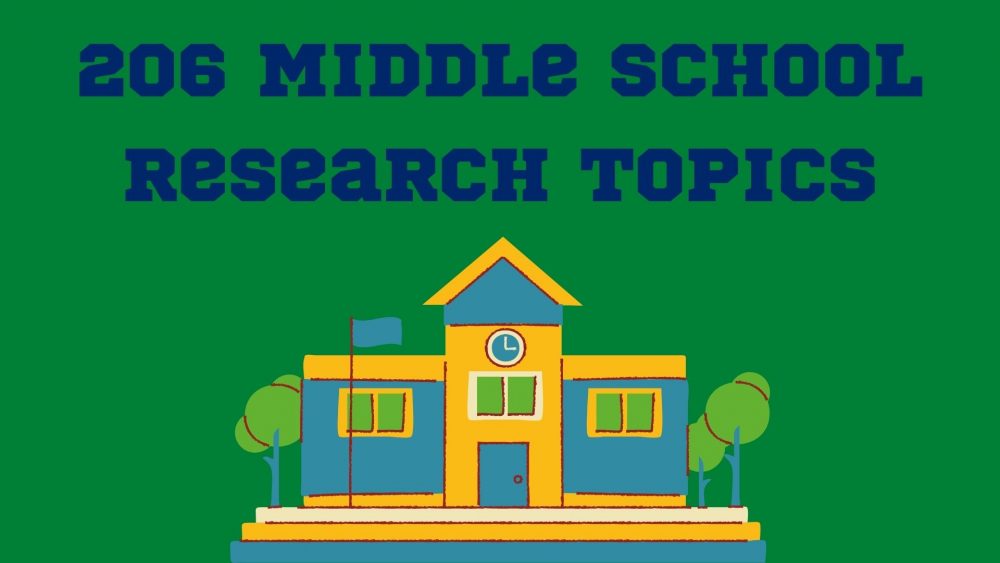
As middle schoolers prepare to go to high school, they are introduced slowly to essay and research writing. They are sometimes given homework that involves picking suitable topics and writing on them. However, it should be noted that i t is not easy to write a research paper for a high grade. Middle schoolers in their preteen age are taught how to be creative, air out their opinions and conduct little research. It helps make them critical thinkers and prepares them for more writing tasks as they advance in their education. This article will help middle schoolers understand what is expected of them when asked to write an essay or research on a topic. It will also expose them to different areas where they can write and many research topics for middle school they can pick from.
What Should Be In A Middle School Research Paper?
Middle school research papers are often not required to be extended. They are in a unique position where they move from writing simple pieces to more detailed essays and research papers. This is the foundation where they learn to write excellent papers as they transcend to high school and eventually college. Writing an essay in middle school is not very different from writing in other stages. Some steps to get you started are
- Understanding the Assignment :Before you begin, you should understand your teacher’s expectations when turning in your finished work.There will be rules and procedures to follow. Know the format the essay is supposed to be written in, and keep the due dates in mind. If you do not understand any aspect of the assignment, please ask for clarification, as this will help you deliver a clear and concise essay at the end.
- Do Your Pre-Writing :Start with brainstorming on middle school research topics to determine what you would like your essay to be about. There are many options to pick from and several general subjects to break down into topics you want.
Pick up to three topics when you first brainstorm. From there, you can select the best one to write on. When you find a topic, start writing all you know about it. Create a rough paper where you jot down information from your research that will be useful in your essay. Feel free to write freely, as this will be your first draft, and you have the chance to edit it as you go.
- Edit Your Work : Editing is essential. It helps give your paper structure. From your rough work, take out parts that are not necessary and add details you think you missed. This is where you should be detailed and try to make your work as neat and correct as possible. You are almost at the end of writing the paper.When you are sure your paper is good, it is time to proofread. Check for spelling and punctuation errors. One expert way to do this is to read the report from the bottom up, and this can help you spot any spelling errors.
- Citations and References : Your teacher would have given you a format to write references for your work. Ensure that you are following the prescribed format.References will highlight the sources of the information gathered to make your essay.
What Can Middle Schoolers Write About?
There are many general subjects that middle schoolers can write about in their assignments. Streaming from what they have been taught in the classroom or their experiences outside class. Some issues that can create good middle school research paper topics include:
Science : This broad aspect covers earth science, geology, physical science, life science, and genetics. Science research paper topics for middle school will encourage the students to be interested in growth and learning how things work. Social Studies : This will involve learning about their history, other people’s cultures, human interaction, family, etc. This will create fun research topics for 6th graders, learning about life and how relationships work. Literature : This is the best time to learn about books and works of art. The literature will provide many topics to research for middle school students.
There are many more aspects that middle school students can research and write papers on. Discover more than 200 interesting research topics for middle school students below. However don’t worry if the assignment seems too difficult for you. You are only at the beginning of the path and our cheap research writing service will be happy to get you through with your paper.
Good Research Topics For Middle School
Students who have no experience writing papers and are looking for good research topics to work on are in luck. The topics below are suitable for all middle schoolers and can create detailed essays.
- Should students be compelled to wear a specific uniform?
- Textbooks or tablets: which is better to read from?
- Obesity in American youth: Causes and solutions.
- Should boys and girls be allowed to play on the same athletics team?
- Should young people be allowed to play violent video games?
- Impact of continuously playing violent video games.
- When can we say someone is spending too much time in front of the screen?
- Listening to music during class: Does it disturb concentration?
- How to recognize harmful content on the internet?
- Should all businesses be compelled to recycle?
- What is the appropriate punishment for students who engage in cyberbullying?
- Should school hours be adjusted to later in the morning?
- Should our scientists be allowed to test drugs on animals?
- Why do people’s behavior change in different settings?
- Is sex education important?
- Different types of poetry and how they came about.
- What to do if you are being bullied on the internet.
- How to have healthy self-esteem.
- Why does the human body need sleep?
- Insect repellents, are they helpful?
- Why did dinosaurs go extinct?
- What is skateboarding?
- The effects of tobacco on the body.
- Artificial tanning: Risks and benefits.
- What is spam email? Where does it come from, and how can we stop it?
- What is a desert mirage? How does it affect people?
- What are penguins? Where do they stay, and what do they eat?
- When and how was America created?
- Who are some well know and inspirational women?
- Who are some famous inventors?
- What famous inventions helped in shaping human existence?
- Steps you can take to protect yourself from scammers online.
- What is a cryptocurrency, and why is it so popular?
- What did the invention of the mobile phone do to change the world?
- How to handle stress from school.
- How can issues in the family affect a child?
- Is your school working hard enough to prevent bullying?
- Should we use mobile phones and tablets in class?
- Does technology make you smarter?
- What is an unhealthy life, and what are the effects?
- Is there any benefit of doing homework?
- What is video game addiction, and how to stop it?
- What is a museum, and what can be found in it?
- What can we do to reduce climate change?
- Is soda suitable for children?
- Does everyone have to go to college?
- Comparing homework and class assignments.
- What is physical education?
- How the internet has changed our life
- What is peer pressure?
- What effect has global warming had on the environment?
- What is racism?
- What is a healthy diet?
- Should students be able to pick what they learn?
- Do movies depict what happens in real life?
- Is arts a vital part of the school curriculum?
- What are the challenges students face?
- How do we conserve energy in our homes?
- What is pop culture?
- Should parents monitor their children’s social media?
Fun Research Topics for Middle School
Writing an essay shouldn’t always be stressful or tedious. These topics will make writing papers fun. The topics below can hold the researcher’s attention for a long time as they work on completing their project.
- How should celebrities who break the law be punished?
- What is bulletproof clothing made of?
- All there is to know about hip-hop.
- What do we know about ninjas?
- Do lie detector tests work?
- What are the ingredients contained in a hotdog?
- Sharks, how do they hunt, and what do they eat?
- How do search engines work?
- Some fascinating extinct animals, and what happened to them?
- How to manage time effectively.
- How does insufficient sleep affect the brain?
- How to let go of bad habits?
- How do parents help us grow?
- How to become a better writer.
- Are dogs and cats enemies?
- Why do parents punish children for bad behavior?
- What is the best punishment for naughty kids?
- Is magic real?
- How to save money effectively?
- What is self-development?
- How to motivate yourself to be a better student?
- When should you begin to earn money?
- What’s the secret of having a successful life?
- How not to become a game addict.
Middle School Research Project Ideas
Research shouldn’t always end as essay writing. Sometimes, you need hands-on projects to keep the middle schooler busy. The list below can serve as an ideal hub for research ideas for middle school students and work as interesting essay topics.
- Investigating what life is like inside a beehive.
- Steps in creating a movie.
- How do our brains store memories and retrieve them when we need them?
- What is a landform?
- What are some important holidays around the world, and who celebrates them?
- What are some significant symbols used in world holidays?
- Creating an ecosystem: what’s the process involved?
- Research on some exotic underwater creatures.
- What is a meteor?
- How to build a crossword puzzle.
- What is advertising: create a short advertisement campaign.
- Write the story of your life.
- Create a calendar highlighting critical events in your life.
- Create your family tree.
Science Research Topics for Middle School
Science is an exciting part of our lives. Because of science, the quality of our lives has increased, and there are many more inventions to come. These topics can engage the curious mind of the youngster and introduce them to science-related subjects to work on.
- Earthquakes: Its causes and effects.
- Computer viruses. What are they, and how do they spread?
- Evolution of human beings.
- Are human beings still evolving?
- What is alchemy?
- What is a black hole? How is it formed?
- What is a submarine? Who uses them, and how do they work?
- What is the cause of tornadoes?
- What is a sinkhole, and how do they form?
- Research on one of the planets in the solar system.
- Understanding glaciers and icebergs.
- What are volcanoes, and how do they form?
- The different types of volcanoes and what causes them.
- Who are the most famous scientists, and what are they famous for?
- What are the components of airplanes that make them fly?
- What are fossils, and what do they teach us?
- How do genetics and DNA affect how we look?
- Why does the moon change color and shape sometimes?
- What is a Lunar eclipse?
- What is pollution?
- The different types of pollution and what can be done to curb them?
- Can fruits play a part in medicine?
- What is flooding?
- What is an ecosystem?
- What measures do butterflies take to defend themselves?
- Different types of butterflies.
- What is a skeleton, and why is it an essential part of the body?
- How many bones are in a skeleton? Which are the most important?
- Who is a marine biologist?
- What is the connection between a marine biologist and the weather?
- What are the risks marine biologists face when they dive?
- Different types of fossils?
- Are whales still hunted?
- What is scientific research, and who conducts it?
- What is the job of the nervous system?
- Understanding the concept of hibernation?
- What are the necessities plants need to grow?
- Who are the people who study dinosaurs?
- Mammals and reptiles: Similarities and differences.
- Why don’t human beings float?
- What is a prism, and what does it do?
- What gives humans the ability to lift heavy things?
- What factors can cause earthquakes?
- How is wind measured?
- What differentiates a planet from a star?
- What is a galaxy? What galaxy is the earth?
- Who is an astronaut, and what is their job?
- What is a waterfall?
- Do plants drink water?
- Why do oil and water not mix?
- What is microbiology?
- How can we preserve our natural resources?
- Discuss the advantages and disadvantages of exploring space.
- What are bacteria, and how useful is it to humans?
- The similarities between temperature and heat.
Other Topics to Research for Middle School
We cannot run out of topics for middle schoolers, as several aspects are available to look at. Here are some other topics that can jump-start your essay writing process.
- Is it advisable for students to be with their cell phones all day?
- Should the minimum age for getting a driving license be raised?
- The differences between homeschooling and standard schooling: which is better?
- Does social media have a positive or negative impact on teenagers?
- Going vegan, is it good for your health?
- Who is a Monk, and what is his lifestyle/routine?
- How did humans domesticate cats and dogs, and why?
- How is America helping endangered animals?
- How is climate change affecting us?
- What are the effects of video games on teenagers and children?
- Do Athletes make good models?
- Who is to blame for the number of homeless people in America?
- Should we have shorter school weeks?
- Should parents monitor websites visited by their children?
- What is cybercrime?
- What can we don’t protect our environment?
- Instant messaging, do they affect literacy?
- What are the most effective ways of achieving academic excellence?
- What is a good movie that influenced us in 2023?
- Are tests a good way of judging a student’s intelligence?
- How does music help us feel better?
- How to choose the best research project ideas for middle school students.
- Why is it important to learn multiple languages?
- Do learning techniques affect behavior?
- Bullying and its effects on mental health.
- All you need to know about distant learning
- Should prayer be part of school activities?
- Do we need math formulas in real scenarios?
- When should students start undergoing leadership training?
- How to write a good essay.
- How does night vision work?
- What is the solar system?
- What is Nasa, and what do they do?
- What is a natural disaster, and what can cause one to happen?
- What is the process of becoming a president of the United States?
- How many presidents has the United States had?
- What are some of the responsibilities and privileges of the president?
- Learning about Vice Presidents and First Ladies of the United States.
- Is social media dangerous for children?
- Does the location where you grow up affect who you become?
- What is a participation trophy? Is it necessary?
- Should there be a screen time limit for children?
- What are the responsibilities of a government to its citizens?
- What is a curfew, and why do kids have them?
- Is grounding an effective punishment?
- Should physical education be necessary for everyone?
- What are some advantages of knowing how to read?
- How can cell phones be used productively while in class?
- What are the qualities of a good leader?
- What are hobbies, and what do they do for us?
- Should less homework be given to students?
- What is summer school? Does it help students?
- What age is appropriate for children to be left alone at home?
If You Need Paper Writing Help
There are many ways to brainstorm ideas for your middle school homework. The research project ideas for middle school and the topics listed above will make it easier to begin. After picking a suitable topic, the next step is writing the entire paper. This will involve a lot of research and fact-finding to get accurate information for your paper. It doesn’t end at research, as you still have to write a great essay to score high marks. This could be a daunting task for many students. Don’t be afraid to get research paper help from our professional writers. After attending class, you may not have adequate time to write your essay yourself, if this is your situation, it’s okay to search for help on the internet. A quick google search for “write my paper” will result in several websites promising to write the best essay for you. However, you need to make your research before hiring an online writer for your assignment. If you need someone to write your assignment, we can be of help. We provide fast, reliable, custom paper writing services that can be completed online. Our services are available to every student, including university, middle school, high school, and college students. Our team of writers consists of professionals and teachers who are always available to ensure that you meet your deadlines. Contact us with a message “ do my research paper for me ” and enjoy the perfect result!

Leave a Reply Cancel reply
Your email address will not be published. Required fields are marked *
Save my name, email, and website in this browser for the next time I comment.
Terms & Conditions Loyalty Program Privacy Policy Money-Back Policy
Copyright © 2013-2024 MyPaperDone.com

The Homeschool Resource Room
creative ideas, practical advice, genuine support

Science Project Research: 10 Engaging Ideas for your Fair!
This post may contain affiliate links. See our disclosure policy for details.
Looking for a research science project? In this blog post, we will explore the world of research based science fair projects specifically tailored for elementary and middle school students.
Science fairs are an exciting way for young minds to delve into the world of scientific discovery, exploration, and creativity. They offer students a unique opportunity to apply critical thinking and research skills, while also having fun. The best science fair projects are often research-based, allowing students to investigate questions and hypotheses, collect data, and draw meaningful conclusions.

The Importance of a Science Project based in Research
Before we delve into project ideas, let’s first understand why a research-based science project is so valuable for young scientists:
- Critical Thinking Skills : Research projects require students to think critically, formulate hypotheses, and design experiments. These skills are essential for future academic success.
- Inquiry-Based Learning : Research projects encourage students to ask questions and seek answers, fostering a sense of curiosity and lifelong learning.
- Real-World Application : Research-based projects connect classroom learning to real-world issues, helping students understand the relevance of science in their lives.
- Data Collection and Analysis : Students learn the importance of collecting and analyzing data, which are skills that can be applied in various subjects and professions.
- Communication Skills : Presenting research findings at a science fair hones communication skills, allowing students to articulate their thoughts and ideas clearly.
Research Science Project Ideas
Now, let’s explore some exciting and age-appropriate research-based science fair project ideas for elementary and middle school students:
1. The Effects of Light on Plant Growth :
Explore how different types of light (natural sunlight, LED, incandescent) affect the growth of plants. Students can set up an experiment with identical plants and varying light sources to measure growth over time.
2. Science Project, Research The Magic of Static Electricity :
Investigate the phenomenon of static electricity by rubbing balloons against different materials and studying how they attract or repel each other. What factors influence static electricity?
3. The Water Cycle in a Bag :
Create a mini water cycle model in a sealed plastic bag. Observe how water evaporates, condenses, and precipitates, mimicking the natural water cycle process.
4. Does Music Affect Plant Growth? :
Explore whether different genres of music can influence plant growth. Set up a controlled experiment with identical plants and varying types of music to see if they grow at different rates.
5. Science Project, Research The Science of Slime :
Unleash the fascination of chemistry by experimenting with homemade slime. Investigate how changing the proportions of ingredients like glue, borax, and water affect the consistency and texture of the slime.
6. Popsicle Bridge Strength :
Build bridges using popsicle sticks and test their strength by gradually adding weight to the bridge until it collapses. What design features make a bridge more durable?
7. What Melts Ice the Fastest? :
Examine different substances like salt, sand, and sugar to determine which one melts ice most rapidly. This project helps students understand the science behind ice removal in cold climates.
8. Paper Airplane Aerodynamics :
Investigate the principles of aerodynamics by designing different paper airplanes and testing their flight characteristics. What factors influence the distance a paper airplane can travel?
9. Science Project, Research The Five-Second Rule :
Study the validity of the “five-second rule” – the belief that dropped food is safe to eat if picked up within five seconds. What bacteria are present on different surfaces, and how quickly do they transfer to food?
10. The Mystery of Mold Growth :
Examine how different variables, such as temperature and humidity, affect the growth of mold on slices of bread. Students can also research the health implications of mold.
Science Project Research Process
To ensure the success of your research based science project, it’s important to guide students through the research process:
- Ask a Question : Encourage students to start with a question or a hypothesis.
- Background Research : Provide resources for students to learn more about the topic. Books, websites, and visits to the library can be helpful.
- Experimental Design : Assist students in designing controlled experiments, ensuring they have a control group for comparison.
- Data Collection : Teach students how to collect data accurately using tables, charts, and measurements.
- Data Analysis : Help students analyze their data and draw meaningful conclusions.
- Presentation : Guide students in creating a visually appealing and informative display board for the science fair.
Science Project Research Conclusion
Research-based science fair projects are an excellent way for elementary and middle school students to engage with the scientific method and develop essential life skills. By exploring topics that spark their curiosity and following a structured research process, young scientists can experience the thrill of discovery and the satisfaction of presenting their findings to peers and mentors.
These projects not only prepare students for future academic pursuits but also foster a love for science and the belief that they, too, can contribute to our collective understanding of the world. So, let’s continue to nurture the curiosity of our budding scientists and inspire them to explore the wonders of the natural world through research-based science fair projects.
Related: – Science Fair Project Ideas: 50 Fascinating Ideas! – Project Based Learning Activities: 50 Engaging Ideas! – Scientific Investigation Project Ideas: 10 Projects to Inspire

Ashley helps parents who want to homeschool find the resources they need to successfully teach their children. Ashley is a former teacher, current homeschooler, published author, and designer behind Circle Time with Miss Fox printables as well as the creator of this website, The Homeschool Resource Room.
Discover more from The Homeschool Resource Room
Subscribe now to keep reading and get access to the full archive.
Continue reading

Science By Sinai
Middle School Science Tips, Ideas, and Resources
50 Fun End of Year Science Activities for Middle School
Are you looking for meaningful, end of year science activities for your middle school students?

Karen Sinai
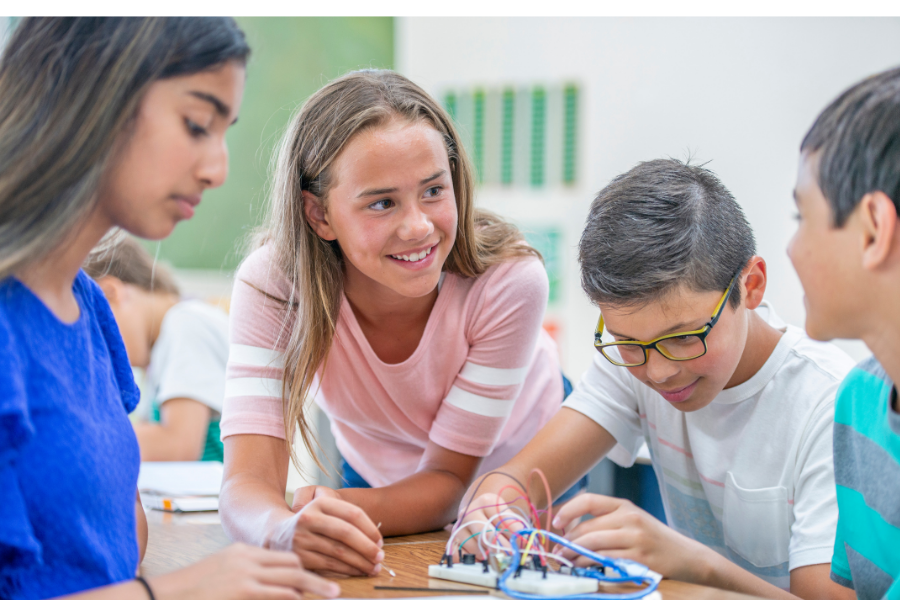
Updated May 18, 2022
I put together 50 end of year science activities such as STEM, critical thinking CER, worthwhile research activities, environmental exploration, crafty ideas and just messy fun projects! I have done the research for you so most ideas have links to get you started!
Exciting STEM Activities to Finish Off the Year
1) Rube Goldberg machines Who doesn’t love these? Grab a ton of recycled materials, some glue and tape and let the students be extremely creative! Read my blog post called How to Create an Exciting but Structured Rube Goldberg Machines Unit about how to keep everything organized and structured to keep your sanity!
2) Design and Create Solar Ovens with Pizza Boxes – Break out the marshmallows and chocolate and use the sun to create yummy treats.
3) Paper airplane contest – When I did this last year I was shocked at how many students have never made paper airplanes! 4) STEM Design and Build Magnet Mazes Students love to create themes such as amusement parks, farms, zoos, Disney World, etc. as they make obstacles for the magnets throughout the maze. Keep the project structured and organized so that the students stay on task. How to Create STEM Magnet Mazes.
5) Paper Roller Coaster – This requires minimum materials and lots of critical thinking.
6) STEM Design a Seed Dispersal Method – Making organic flowers and seeds out of recyclables really has the kids thinking.
7) Design and Build a Water Filter – Make the dirtiest water you can for the students to “clean”.
8) Foam Insulation Roller Coaster – Cut foam pipe insulation in half and twist it all over your walls for a super fun marble roller coaster.
9) STEM Design and Build Craft Stick Bridges – Have students first research bridge designs and then try to create the strongest one on their own.
10) Design an Aluminum Foil Boat to hold pennies. -Give students a certain amount of aluminum foil and have them design boats to hold weight.
11) STEM Mutualism Symbiosis Structured Project -Review relationships between animals and have students design two animals that have a symbiotic relationship.
12) Design an Egg Drop (with international rules) -An old favorite and this site has the basic rules.
13) Balloon Cars – Tons of fun racing these cars.
14) STEM Design and Build Electrical Circuit Games -Students design games using their knowledge of basic electrical circuits. We love to invite younger students in to play the games! This blog post describes how we do it. How to Create STEM Electrical Circuit Games.
15) Paper Ball Run Challenge – Great, inexpensive activity.
16) Spoon and Popsicle Stick Catapults – We all love flinging things!
Entire STEM Based Units
17) Steven Spangler This website has tons of ideas for all types of labs.
18) Science Buddies -Great site for STEM ideas.
19) Science Spot – Survivor Science – An entire unit, based on the TV Show, that could take a week to cover.
20) Science Spot- Junk Box Wars. A well organized unit using cheap materials.
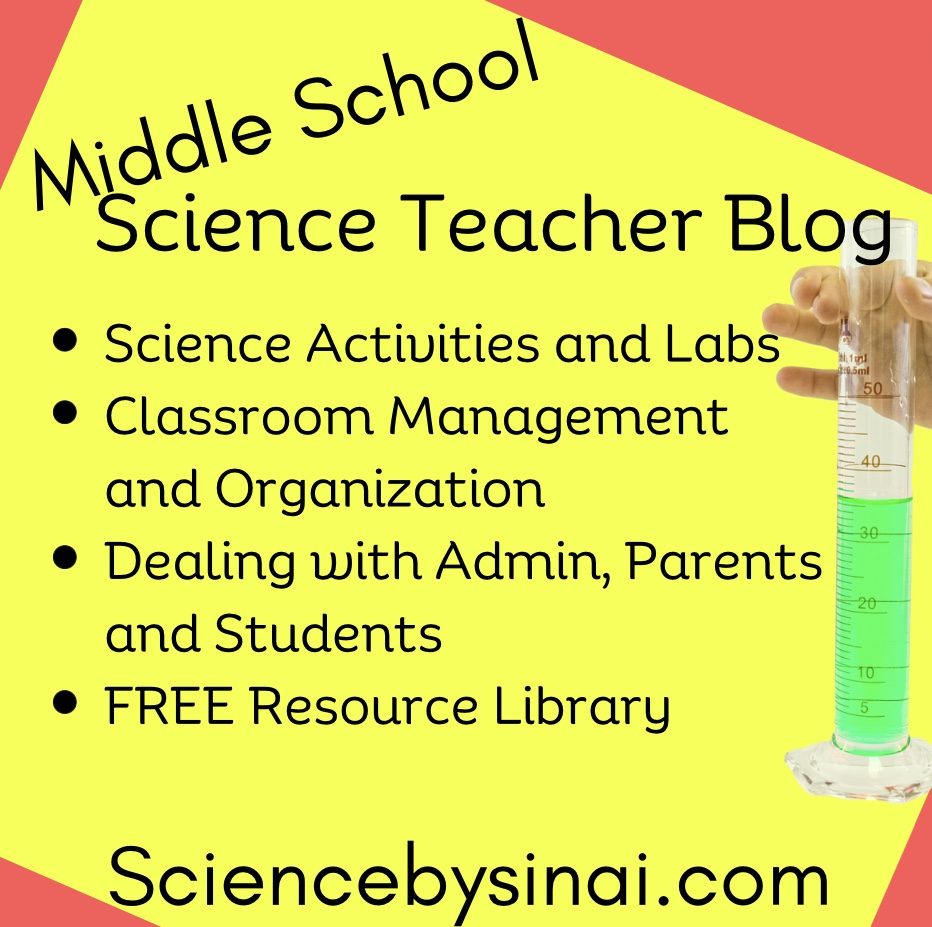
Messy But Lots of Science Going On
21) Bake bread with different ratios of ingredients for the students to taste test. Use any bread recipe and change out ingredients and/or proportions. Cooking chemistry is probably something most students never thought about.
22) Dissect hearts or a brain. Preserved materials are good but one year I had a butcher come in with some fresh organs, which was amazing!
23) Play With Dry Ice Day – Dry ice is super fun as long as proper supervision is in place.
24) Make Oobleck -Whether each student makes their own or you make a giant batch, cornstarch and water makes a super fun goo to play with for hours.
25) Launch Alka-Seltzer Rockets – You will have to order old film canisters for these but they are worth it.
26) Make Ice Cream in a Ziploc Bag _ Such a great hot day activity with a lot of science to discuss.
27) Make Slime! – Instant crowd pleaser!
28) Make Puffy Slime using Shaving Cream – Not as stretchy but a fun, great smelling alternative to regular slime.
29) Make bubble experiments -Everyone loves bubbles! Have the students experiment with different wand shapes, bubbles inside of bubbles, or different proportions for the soap solution.
30) Density experiments -There are lots and lots of density experiments that you can come up with such as guessing if something will float in water or not, building density towers, oil and water experiments, etc.
Environmental Exploration Projects
31) Food Web Dice Roll Game For Events Causing Changes in Populations and Biodiversity -Students draw out a food web from a specific biome, connecting the plants and the animals of their food chains. They then roll a pair of dice that determines either a man-made or natural event that affects different aspects of that food web. If a specific plant or animal is affected by that event, then the lines are erased on their food web. Since this is a game of chance, not all of the students will come out with the same results at the end which leads to great discussions!
32) Abiotic/Biotic Schoolyard Ecosystem Scavenger Hunt. -I do this activity at least three times during the school year. I take the kids outside and we walk around with the scavenger hunt guide, on their iPads, and observe the changing seasons. My blog post called Go Outdoors on an Exciting Schoolyard Ecosystem Scavenger Hunt! explains the components of the hunt.
33) Design an animal from two animals- This is a fun and interesting project where students take two unrelated animals and combine them into one. They need to determine it’s needs and habitat as well. The students love either drawing their new creatures or using a Photoshop app to combine two images.
34) Watch the Lorax Movie -I have never once had a class that wasn’t quiet and mesmerized watching this movie. Such great discussions can happen afterwards! I have seen extensions to this with students making the Truffle trees out of various materials. I also like to have the students write what would happen next if the movie continued.
35) Explore Pond Microorganisms as Bioindicators of Water Pollution .-If you have a pond nearby, or are you were able to collect pond water yourself, students love looking under the microscopes at the unbelievably diverse creatures! It’s very helpful to have reference images to know what they are finding. I also put together references as to which creatures are more or less tolerant of pollutants. My blog post called Identifying Pond Water Microorganisms as Bioindicators explains how I use them.
36) Build a Zoo -I know a lot of teachers do a variation of this project and it really is great. Students need to come up with the abiotic and biotic features for their specific animal and then design an enclosure with all of the needs met. The individual enclosures can then be put together into a giant map of the classroom zoo.
Critical and Creative Thinking Activities
37) CSI -This is just one of many websites describing how you can do a very fun CSI unit with lots of inexpensive and fun activities such as fingerprinting, mystery powders, acid and base testing, etc.
38) Genetic Project – This is one of my all-time favorites and it has become a favorite of my students as well! Students design a male and female alien that is especially adapted to a planet that they invent. They come up with the traits and then use Punnett squares to create the babies. I made this well structured which makes it easier. If time permits, we also love to make the aliens into three-dimensional creatures along with designing a planet surface.
39) Pringles Potato Chip Circle Challenge -If you haven’t seen this all over social media, the idea is that you stack the potato chips in a standing ring without using any glue or adhesive. It’s hard but it’s very satisfying when it works!
40) CER Image Prompts for Critical Thinking -I like to start and finish my year with a review of the basics of CER methods. The students like using the image prompts from either life, physical or earth science to figure out the scientific question asked.
41) Pretests for next year- This can be a good opportunity to see what the students know about your units for next year. This is particularly helpful if you teach multi levels of science in middle school.

Worthwhile and Interesting Research Activities
42) Research an Invasive Species -Many of our “local” animals and plants are actually invasive species. Students choose from a list of many different plants and animals and research the areas that are being invaded and how it occurred.
43) Research A Storm – Many kids are very interested in the big storms such as tornadoes, hurricanes and supercell thunderstorms. This is a very structured layout, with research prompts, and the kids can then present to the class.
44) Research a Scientist-I had a teacher friend who had the students research a scientist and then present to the class dressed up as that scientist may have dressed. The kids loved it and it was very interesting.
45) Research an Element-there are actually many different types of activities online for students to choose. I have seen making an advertisement for that element, a history of that element, a superhero made from the element, etc.
Crafty Science Projects
46) Make Shrinky Dinks -You will need access to an oven to do this project but the students really love it!
47) Paint T-shirts or lab coats-If the students have old shirts, or you have a budget for inexpensive lab coats, this can be a lot of fun with fabric paint.
48) Make Kites -You may be surprised how many kids have never flown a kite!
49) Build a Cardboard Mechanical Hand -This takes patience and time but, in the end, students understand the complexity of the human hand.
50) Design Growth Mindset posters for next year- have the students come up with their own mindset statements and make posters to hang around your classroom.
Ending the year with creativity and active, hands-on learning, is a great way to pull everything together. This is particularly important if the students have just sat through state testing and have very little mind space left for a deep unit. I am always pleasantly surprised at how engaged and enthusiastic they are with the end of the year science activities!

Similar Posts
How to Make Food Webs Interactive and Fun!
How to Make Food Webs Interactive and Fun! Are you looking for more engaging ways to teach the important concepts of food chains and webs? Do you want dynamic activities that you can refer back to over and over again? Here are some super fun activities that involve every student in a memorable, exciting way!…

Teaching Students Organizational Skills
Teaching Students Organizational Skills Teaching students organizational skills is critical and will stay with students long after their time in your classroom. I have often had alumni students come back to tell me how much they appreciated my “forcing them“ to do proper Cornell notes and to keep an organized notebook. They tell me that…
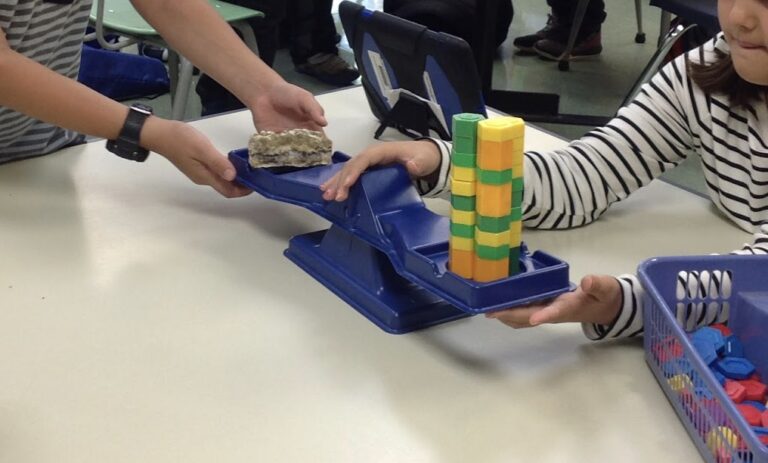
Give Your Students a Measurement Review with these 10 Fun Activities
Give Your Students a Measurement Review with these 10 Fun Activities Are you finding that middle school students seem to lack basic measurements skills in spite of us reviewing and reinforcing this as we head back to school every year? I can’t tell you how many times I’ve had middle schoolers measure from the end…

Dealing With Difficult Parents as a Teacher
Dealing With Difficult Parents as a Teacher Are you dealing more and more with difficult parents in your teaching job? Have you received an unexpected nasty email? Has a parent become angry about something in your classroom? What strategies can you use to diffuse the situation? Dealing with difficult parents, as a teacher, can be…
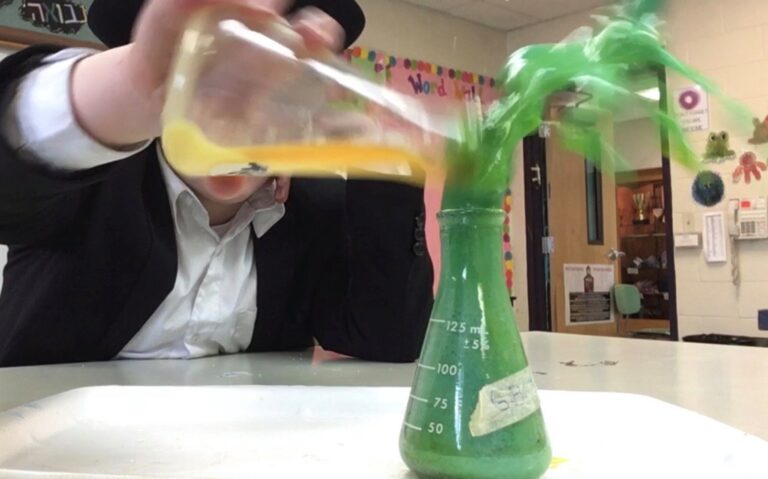
Planning Lab Activities for Middle School Science Class
Planning Lab Activities for Middle School Science Class Are you struggling with planning lab activities while teaching middle school science? How do you introduce the lab, execute it, clean up and draw conclusions in one class period? I use a method that I call “backwards lesson planning” as I am planning lab activities for my…
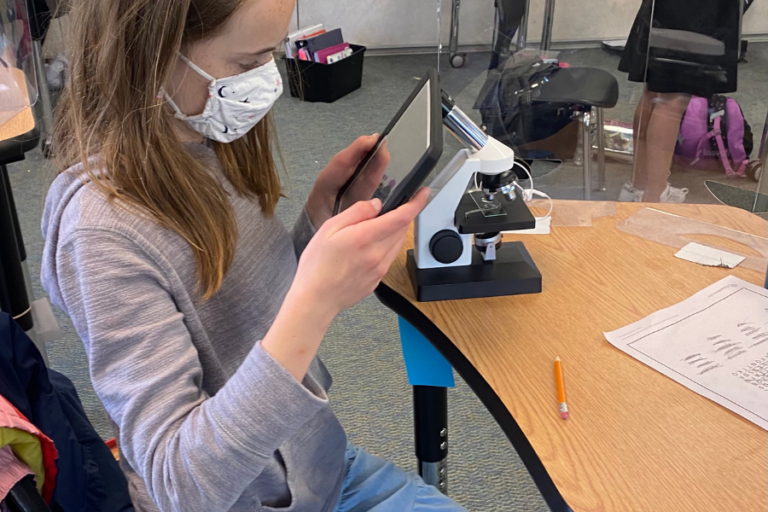
How Digital Notebooks Will Actually Help with Classroom Management
Digital interactive notebooks will help your classroom management in so many ways. Are you thinking that having devices in students’ hands can be so distracting that it leads to behavior issues?
Final Summer I 2024 Application Deadline is June 2, 2024.
Click here to apply.

Featured Posts

10 Reasons Why You Should Apply to APA’s Internship for High School Students

Stanford STaRS Internship Program - Is It Worth It?

How to Show Demonstrated Interest - 8 Tips for College Admissions

10 Free Summer Math Programs for High School Students

10 Online Summer Camps for Middle School Students

6 Entrepreneurship Internships that You Should Check out as a High School Student

10 Free Biology Summer Programs for High School Students

10 Free Programs for High School Students in California

NASA's High School Aerospace Scholars - 7 Reasons Why You Should Apply

10 Film Internships for High School Students
10 Research Opportunities for Middle School Students
If you're aiming to lay a strong foundation for your academic journey, starting early can make all the difference. Engaging in research-based programs during these formative years can ignite a passion for learning, shape future interests, and set the stage for success in high school and beyond.
That's why we've curated a list of ten research opportunities for middle school students which offer a chance to delve into diverse fields of study, from science and technology to mathematics and beyond. Many of them provide financial aid and scholarships as well.
1. Lumiere Junior Explorer Program
The Lumiere Junior Explorer Program is an 8-week program for middle school students to work one-on-one with a mentor to explore their academic interests and build a project they are passionate about . Our mentors are scholars from top research universities such as Harvard, MIT, Stanford, Yale, Duke and LSE .
During this program, spanning weeks 1 to 4, participants will delve into four distinct topics within their selected track. In weeks 5 to 6, the focus intensifies as participants embark on a deep dive into one specific topic area and finally, weeks 7 to 8 are dedicated to project implementation, with participants receiving guidance and support from their mentors as they bring their projects to life.
You can find the application form here.
Location: Fully Virtual
Dates: Multiple cohorts throughout the year
Cost: $1990
Age requirements: Grade 6 - 8
Deadline: Multiple rolling deadlines for JEP cohorts across the year, you can apply using this application link ! If you'd like to take a look at the cohorts + deadlines for 2024, you can refer to this page!
2. Junior Scientist Training Program at Scripps Research
Throughout the process of designing and executing a research project, students will acquire invaluable practical skills. They will have the opportunity to participate in laboratory tours and engage in various STEM activities . By the end of the week, students will showcase their findings to their peers through presentations. Additionally, participants will receive a certificate of completion from Scripps Research, recognizing their successful participation in the program.
To begin the application process for the Junior Scientist Training Program for your middle school child or children, the first step is to create a login using your personal information. After completing the login process, you'll have the opportunity to register your child and any additional middle school children through the provided link .
Location : La Jolla, California
Dates : TBD
Cost : $300
Age requirements : Rising 6-8th graders
Deadline : Rolling, registration ends on May 13th.
3. Summer Teen Research Program
The Lawrence program at UC Berkeley is a unique research opportunity for middle school students to explore the wonders of science firsthand!
This one-week research program offers immersive experiences, hands-on experiments, and exciting campus tours designed to spark curiosity and ignite a passion for STEM . With engaging lab sessions, interactions with faculty and students, and exposure to diverse STEM career paths, The Lawrence program provides a dynamic learning environment where students can thrive and grow.
There are four programs available for middle school students. All these programs have a research component in them.
Body Systems and Biomedical Innovations
Coding and Engineering Nano-Satellites
Solar Energy and Electrical Engineering
Designing and Engineering Bridges
Note: Optional Residential Add-on can only be purchased in conjunction with a daytime Teen Research Program offered during the same week. Additionally financial aid is available for this program.
Find the registration link here.
Location : UC Berkeley Campus
Dates : Sunday, June 23, at 4:00 p.m. and ends Friday, June 28, at 5:00 p.m.
Age requirements : Rising 7th-9th graders
Deadline : May 15th, 2024.
4. Sounds of New York City (SONYC)
The SONYC program is an innovative platform designed to ignite and enrich students' passion for science, technology, engineering, and mathematics (STEM). Through a dynamic curriculum crafted to delve deep into the realms of engineering, physical and computer sciences, as well as natural phenomena such as waves and sound, SONYC fosters a profound understanding and appreciation for these disciplines.
This program is about active engagement and exploration where students delve into the research work of intricate workings of microcontrollers, sensors, and various hardware components, unravel the mysteries of circuitry, electronics, and coding, and gain invaluable insights into how scientists and engineers apply fundamental principles to tackle real-world challenges.
To apply, submit the online application which includes questions about your personal and academic history and two short essay responses. Find the application link here.
Note : Students who live in New York City are only eligible. Students should also have a strong academic record and demonstrated interest in science.
Location : New York University
Dates : July 8 - August 4 Orientation: June 28 (via Zoom 1:00 - 4:00 PM ET)
Cost : Full Scholarship
Age requirements : 12- 14 years.
Deadline : April, 14th.
5. Science of Smart Cities (SoSC)
The School of Sustainable Cities (SoSC) is a three-week education program where students get invaluable opportunities to research about the developments in energy, engineering, computer science, and urban/environmental science.
The program's focus on research extends across various disciplines, from understanding the intricacies of energy systems to analyzing the impact of urbanization on the environment. Students have access to state-of-the-art facilities and resources, enabling them to conduct experiments, gather data, and draw informed conclusions.
Students are encouraged to ask questions, challenge assumptions, and pursue their interests through independent research projects. SoSC also emphasizes the importance of community-engaged research, where students collaborate with local organizations and stakeholders to address pressing issues facing their communities.
To apply, submit the online application which includes questions about your personal and academic history and two short essay responses.
Dates : July 8 - August 2 Orientation: June 28 (via Zoom 1:00 PM - 4:00 PM ET)
6. Science and Technology Entry Program(STEP)
NYU's Science and Technology Entry Program (STEP), where students embark on a journey of research and discovery. L ed by NYU faculty and students, STEP offers immersive STEM courses, research opportunities, and mentorship, preparing students for academic and career success. Through STEP, students increase their college readiness and diversity in STEM fields, all while fostering a passion for research and innovation.
Students are afforded the chance to engage in STEM research within an NYU facility, where they receive guidance from faculty and researchers . Subsequently, these students showcase their research outcomes at the yearly STEP State Conference held in Albany, NY.
To apply, complete the online application, which requires you to provide basic information about yourself, your academic history, a transcript or report card, and a 500-word essay that describes your interest in STEM.
Dates : July 5-August 4
Cost : $350
Age requirements : 6th -8th
Deadline : March 24th.
7. Everyday Engineering
Everyday Engineering is a unique program tailored by Carnegie Mellon University College of Engineering for students in grades 6th through 8th, with a distinct focus on fostering a research-oriented perspective towards engineering. Unlike traditional approaches, this program transcends the boundaries of mere observation by encouraging middle school students to delve deeper into the intricacies of their everyday environments through a research perspective.
Everyday Engineering aims to instill in students a heightened sense of curiosity and a research-driven mindset. Through exploration of recognizable examples, exposure to online exhibits, and interaction with CMU engineering students, participants not only gain insight into various engineering disciplines but also learn to approach everyday phenomena through a rigorous research framework.
Please find the registration link here.
Location : Virtual
Dates : February 24th from 10 a.m. - 12 p.m.
Deadline : TBA
8. North Carolina State University's Summer Ventures
North Carolina State University's Summer Ventures in Science and Mathematics is a four-week immersive summer program designed to provide exceptional middle and high school students with advanced learning opportunities in STEM fields.
While primarily targeted at high school students, Summer Ventures also offers research opportunities for outstanding middle school students who demonstrate a strong interest and aptitude in science and mathematics.
The program typically runs for four to five weeks during the summer and takes place on NC State University's campus. Students have the opportunity to work alongside older peers and university professors on research projects in various STEM disciplines, including biology, chemistry, physics, mathematics, computer science, and engineering . These projects may involve conducting experiments, analyzing data, and presenting findings, allowing middle schoolers to gain hands-on experience in scientific inquiry and exploration.
Location : North Carolina State University
Dates : TBA
Cost : None
Age requirements : Middle and high school students
9. Northwestern University's Center for Talent Development's Summer Camp
Northwestern University's Center for Talent Development's Summer Camp is an esteemed initiative designed to provide students with immersive research experiences under the guidance of university faculty mentors.
It engages students in research-oriented learning experiences. Tailored for high-achieving and motivated individuals, these camps offer opportunities to delve into high school, college-level, and pre-professional instruction under the guidance of master teachers and industry leaders .
Participants are exposed to fast-paced, intensive courses that delve into advanced concepts across various disciplines, including math, science, writing, technology, leadership, and service learning. Through rigorous coursework, students are encouraged to grapple with complex problems and develop critical thinking and creative problem-solving skills.
Note: Financial aid is available for the qualified students.
Location : Northwestern University
Dates : June 23 - July 12, 2024 (Other sessions available as well)
Cost : $4650 (Residential camp)
Deadline : June 5th for session 1.
10. California State Summer School for Mathematics and Science (COSMOS)
COSMOS stands as an intensive four-week summer residential Pre-College Program tailored for high school students who showcase a proclivity for academic and professional pursuits within the realm of science, technology, engineering, and mathematics (STEM) subjects.
Catering to motivated and gifted students in grades 8 through 12, COSMOS provides an unparalleled opportunity to collaborate with esteemed faculty, researchers, and scientists within cutting-edge facilities, delving into advanced STEM topics that extend beyond the scope of typical high school courses in California. Through a blend of hands-on activities and laboratory-intensive curricula, COSMOS not only nurtures students' interests and skills but also broadens their awareness of educational and career pathways within STEM fields.
Note: Students apply to ONE of the five University of California’s COSMOS campuses — UC Davis, UC Irvine, UC Los Angeles, UC San Diego, and UC Santa Cruz. Each campus can only accommodate about 160-200 participants. The selection is competitive.
Location : University of California’s COSMOS campuses
Deadline : Feb 9th.
Stephen is one of the founders of Lumiere and a Harvard College graduate. He founded Lumiere as a Ph.D. student at Harvard Business School. Lumiere is a selective research program where students work 1-1 with a research mentor to develop an independent research paper.
- middle school students

Exploring Exciting Research Topics for Middle School Students
Are you searching for the best research topics for middle school? If yes, then your search ends here with the best ever research topics for middle school.
Research is an essential aspect of learning, and it is never too early to introduce it to students. Middle school is an excellent time for students to start learning how to conduct research and develop critical thinking skills. By engaging in research projects, students can explore various topics in-depth and develop a deeper understanding of them.
Additionally, research projects can help students develop crucial skills such as time management, organization, and communication. This guide will provide examples of research topics for middle school students and offer tips on how to identify research topics and access scholarly sources. With this guide, students can discover the exciting world of research and the many benefits it offers.
Importance of research topics for middle school students
Table of Contents
Have a close look at the importance of research topics for middle school students.
Develop critical thinking skills
Research topics encourage students to analyze information, think critically about issues and topics, and make informed decisions. This helps them develop their ability to assess evidence and draw conclusions.
Enhance academic skills
Research projects help students develop essential academic skills such as reading, writing, and critical thinking. These skills are critical for success in high school, college, and beyond.
Prepare for high school and beyond
Research projects prepare students for the more in-depth research assignments they will encounter in high school and beyond. It also prepares them for the rigors of college-level research.
Foster creativity
Research projects can provide students with opportunities to explore creative ways of presenting information and engaging with their topic. This can include using technology, art, or multimedia presentations to showcase their findings.
Encourage curiosity
Research projects can encourage students to ask questions, investigate, and discover new information about topics that interest them. This helps them develop a love of learning and become lifelong learners.
Develop time management skills
Research projects require planning and organization, and can help students develop time management skills. This prepares them for managing their time and workload in high school, college, and beyond.
Promote collaboration
Research projects can be done individually or in groups, allowing students to collaborate, share ideas, and learn from one another. This helps them develop teamwork skills and learn to appreciate diverse perspectives.
Increase engagement
Research topics that are relevant and interesting to students can increase engagement and motivation in learning. This can help students become more invested in their education and develop a deeper understanding of the topic.
Improve communication skills
Research projects can help students develop communication skills, such as presenting findings and participating in discussions. This helps them become better communicators and prepares them for future academic and professional pursuits.
Encourage lifelong learning
Research projects can foster a love of learning and encourage students to continue exploring new topics throughout their lives. It helps them develop a sense of intellectual curiosity and a desire for continued personal growth.
Benefits of engaging in research projects
Have a close look at the benefits of engaging in research projects.
Enhances critical thinking skills
Research projects not only require students to gather information but also to analyze, synthesize, and evaluate it from various sources. These skills are essential for developing critical thinking skills, which are crucial for academic and real-life situations.
Promotes problem-solving skills
By engaging in research projects, students learn to identify problems, develop hypotheses, and test them. Through this process, they acquire problem-solving skills, which are essential for academic success and life beyond school.
Develops creativity
Research projects often require students to think outside the box and come up with innovative solutions. This encourages creativity, which is a valuable skill for success in many areas of life, from science to the arts.
Improves communication skills
Research projects often require students to present their findings in written or oral form, which helps improve their communication skills. The ability to communicate effectively is crucial for academic and professional success.
Boosts confidence
Successfully completing a research project can give students a sense of accomplishment and boost their confidence in their abilities. This, in turn, can lead to greater motivation and engagement in learning.
Provides hands-on learning experiences
Research projects allow students to apply what they have learned in the classroom to real-world situations, providing hands-on learning experiences. This can help students connect what they learn in school to the world around them.
Encourages independent learning
Research projects require students to work independently and take ownership of their learning, which encourages self-directed learning. This is a valuable skill that can help students become lifelong learners.
Builds research skills
Engaging in research projects helps students build research skills, such as conducting literature reviews, designing research studies, and analyzing data. These skills are essential for success in college and many careers.
Prepares for college and career
Research projects provide valuable experience that can prepare students for college and careers that require research and critical thinking skills. These skills are highly valued by colleges and employers.
Fosters a love of learning
Engaging in research projects can foster a love of learning and curiosity about the world around us. This can lead to a lifelong passion for learning and exploration.
Research Topics for Middle School
Have a close look at research topics for middle school.
STEM Research Topics
Here are some STEM research topics that middle school students can explore:
- Renewable energy sources and their impact on the environment
- The effects of pollution on local ecosystems
- Investigating the properties of different types of soils
- Building and testing a simple machine or robot
- The effects of different types of fertilizers on plant growth
- The relationship between exercise and heart rate
- The chemistry of food preservation
- The physics of roller coasters and amusement park rides
- Investigating the efficiency of different types of insulation materials
- The effects of music on the brain and body
How to Identify a STEM Research Topic
Have a close look at how to identify a stem research topic.
Identify your interests
Think about what subjects interest you in STEM, such as biology, chemistry, physics, engineering, or computer science.
Explore current events
Look at recent news articles or scientific journals to see what topics are currently being researched and discussed in STEM fields.
Consider problems and challenges
Think about problems or challenges in the world that could be addressed with STEM research, such as climate change, renewable energy, or medical advancements.
Brainstorm ideas
Write down any ideas that come to mind based on your interests and the topics you have explored. Consider how you could approach these topics from a STEM perspective.
Research existing studies
Look at existing research studies in your area of interest to see what has already been done and what gaps still exist that you could explore.
Consult with experts
Seek guidance from teachers, professors, or professionals in STEM fields to help you identify potential research topics and provide resources.
By following these steps, you can identify a STEM research topic that aligns with your interests and has the potential to contribute to the field.
Benefits of STEM Research Projects
Engaging in STEM research projects can offer a variety of benefits for middle school students, including:
Development of critical thinking skills
STEM research projects require students to analyze data, identify patterns, and draw conclusions, which enhances their critical thinking abilities.
Hands-on learning experiences
STEM research projects provide opportunities for students to apply what they have learned in the classroom to real-world situations, which offers hands-on learning experiences.
Preparation for future careers
STEM research projects can prepare students for careers in science, technology, engineering, and math, as they develop skills relevant to these fields.
Fostering creativity
STEM research projects often require students to think outside the box and come up with innovative solutions, which fosters creativity.
Development of research skills
Engaging in STEM research projects helps students build research skills, such as designing experiments, collecting and analyzing data, and drawing conclusions.
Collaboration
STEM research projects can be done individually or in groups, allowing students to collaborate, share ideas, and learn from one another.
Improvement of communication skills
STEM research projects often require students to present their findings in written or oral form, which helps improve their communication skills.
Boosting self-confidence
Successfully completing a STEM research project can give students a sense of accomplishment and boost their self-confidence in their abilities.
Encouragement of lifelong learning
STEM research projects can foster a love of learning and encourage students to continue exploring new topics throughout their lives.
Social Science Research Topics
Examples of social science research topics for middle school students:
- The impact of social media on mental health.
- Gender inequality in education and the workplace.
- The effects of poverty on child development.
- The relationship between stress and physical health.
- The role of parenting styles in child behavior.
- The effects of bullying on mental health and social relationships.
- The impact of immigration policies on families.
- The influence of media on body image and self-esteem.
- The relationship between personality and academic achievement.
- The effects of technology on social relationships.
How to identify a social science research topic:
To identify a social science research topic, you can follow these steps:
Identify a broad area of interest
Begin by thinking about the general field of social science that interests you the most. This could be psychology, sociology, anthropology, economics, political science, or any other related field.
Narrow down the focus
Once you have identified a broad area of interest, narrow down your focus to a specific topic or issue within that field. For example, if you are interested in psychology, you might focus on a specific mental health condition or treatment.
Consider current events
Look at current events or issues that are receiving a lot of attention in the news or media. Consider how you can apply social science research methods to study these topics in more depth.
Talk to your teachers, professors, or other experts in the field to get ideas for research topics. They may be able to provide you with valuable insights and suggestions.
Conduct a literature review
Conducting a literature review involves reading published research studies, articles, and books related to your topic. This will help you understand what research has already been done in the field and identify any gaps or areas that need further exploration.
Refine your research question
Once you have identified a topic of interest, refine your research question by making it more specific and focused. This will help you to develop a clear research plan and stay on track during your project.
Benefits of social science research projects
Have a close look the benefits of social science research topics.
Improved critical thinking skills
Social science research projects require students to analyze and evaluate information from various sources, which helps develop their critical thinking skills.
Enhance problem-solving skills
Through research, students can identify problems and find solutions by gathering and analyzing data, developing hypotheses, and testing them.
Develop empathy
Social science research projects often require students to explore topics related to human behavior and interactions, which can help them develop empathy and understanding for others.
Foster a love of learning
Engaging in social science research projects can foster a love of learning and curiosity about the world around us.
Develop research skills
Social science research projects allow students to develop important research skills such as conducting literature reviews, designing research studies, and analyzing data.
Enhance communication skills
Social science research projects often require students to present their findings in written or oral form, which can help improve their communication skills.
Promote civic engagement
Social science research projects can encourage students to become active and engaged citizens by exploring issues related to society and government.
Expand cultural awareness
Social science research projects can help students understand and appreciate different cultures, beliefs , and perspectives.
Prepare for college and career
Social science research projects provide valuable experience that can prepare students for college and careers that require research, critical thinking, and communication skills.
Humanities Research Topics
Examples of humanities research topics for middle school students:
- The impact of art and music on society
- The history and cultural significance of traditional dress
- The role of religion in shaping world events
- The influence of ancient civilizations on modern society
- The significance of oral history in preserving cultural traditions
- The portrayal of gender roles in literature and media
- The impact of social media on interpersonal communication
- The role of government in promoting human rights
- The significance of historical landmarks in shaping national identity
- The portrayal of mental health in literature and media.
How to identify a humanities research topic
Have a close look at how to identify a humanities research topics.
Brainstorm topics
Begin by brainstorming ideas that interest you or your students. This can include topics related to literature, history, art, philosophy, or culture.
Narrow down the ideas
Once you have a list of potential topics, start narrowing them down by considering the available resources, the level of complexity, and the relevance to current events or personal interests.
Conduct preliminary research on the narrowed-down topics to ensure that there is enough information available and that the topic is suitable for a research project.
Consider different perspectives
Humanities topics often involve multiple perspectives and interpretations, so it’s essential to consider different viewpoints and debates related to the topic.
Consult with teachers or librarians
Ask for input from teachers or librarians who specialize in humanities subjects. They may have ideas for topics, recommended resources, or can help guide students towards a suitable topic.
Refine the topic
Once a suitable topic has been identified, refine it further by clarifying the research question, determining the scope of the project, and outlining the research methodology.
Benefits of humanities research projects
Have a close look at the benefits of humanities research projects.
Developing critical thinking skills
Humanities research projects require students to analyze information, form opinions, and develop arguments, which helps them to think critically.
Enhancing creativity
Humanities research projects often require students to think creatively about how they present their findings and engage with their topic.
Improving communication skills
Humanities research projects often involve written or oral presentations, which help students to develop their communication skills.
Encouraging curiosity
Humanities research projects can encourage students to ask questions and explore new topics, fostering their curiosity.
Developing empathy
Humanities research projects often involve examining different perspectives and cultures, which can help students to develop empathy and understanding for others.
Preparing for higher education
Humanities research projects provide students with valuable research skills and a foundation for more advanced research projects in high school and college.
Increasing engagement
Research topics that are relevant and interesting to students can increase engagement and motivation in learning.
Encouraging lifelong learning
Humanities research projects can foster a love of learning and encourage students to continue exploring new topics throughout their lives.
Interdisciplinary Research Topics
Examples of interdisciplinary research topics for middle school students:
- How does climate change affect biodiversity?
- The impact of technology on society and culture.
- The role of music in mental health.
- How do food and nutrition affect brain development and academic performance?
- The history and science of flight.
- How does social media influence body image and self-esteem?
- The connection between art and science in creating visual illusions.
- The impact of sports on physical and mental health.
- The psychology and biology of addiction.
- The history and science of ancient civilizations.
How to identify an interdisciplinary research topic
Have a close look at how to identify an interdisciplinary research topic.
Look for common themes or issues
Think about topics that overlap between different subjects. For example, climate change is a topic that can be explored in science, social studies, and literature.
Identify the questions
Once you have identified a common theme or issue, think about the questions that arise from it. What do you want to learn or investigate about this topic?
When exploring interdisciplinary topics, it’s important to consider different perspectives from different subjects. For example, if you’re researching climate change, you might want to explore the scientific causes and effects, the social and economic impacts, and the ethical and moral considerations.
Brainstorm possible connections
Consider how the different subjects you’re interested in can connect to the topic you want to explore. For example, if you’re interested in exploring the history of music, you might look at how different historical events influenced music and how music, in turn, influenced history.
Refine your topic
Once you have some possible connections, refine your topic by focusing on a specific aspect or question. This will help you narrow your focus and make your research more manageable.
If you’re having trouble identifying an interdisciplinary research topic, consider consulting with your teachers or librarians. They may be able to offer guidance or suggest resources that can help you identify a topic.
Benefits of interdisciplinary research projects
Have a close look at the benefits of interdisciplinary research projects.
Encouraging creativity and innovation
Interdisciplinary research topics often require students to approach problems from different angles and find creative solutions by combining knowledge from different fields.
Enhancing critical thinking and problem-solving skills
Interdisciplinary research requires students to analyze and synthesize information from various sources, think critically, and solve complex problems.
Promoting collaboration and teamwork
Interdisciplinary research often involves working in teams, which fosters collaboration, communication, and teamwork skills.
Providing a broader perspective
Interdisciplinary research allows students to gain a more comprehensive understanding of a topic by examining it from multiple perspectives.
Developing research skills
Interdisciplinary research projects help students develop research skills, such as conducting literature reviews, collecting and analyzing data, and presenting findings.
Preparing for future academic and career opportunities
Interdisciplinary research projects provide students with valuable experience and skills that can prepare them for future academic and career opportunities that require interdisciplinary approaches.
Resources for Conducting Research
There are various resources available for middle school students to conduct research. Here are some examples:
School Library
The school library is a great resource for finding books, academic journals, and other resources on a wide range of topics. Librarians can also provide guidance on how to find and evaluate sources.
Online Databases
There are several online databases that provide access to academic journals, magazines, and other scholarly sources. Examples include JSTOR, Project MUSE, and Academic Search Premier.
Google Scholar
Google Scholar is a search engine that allows you to find scholarly articles, books, and conference papers. It can be a useful tool for finding academic sources on specific topics.
Public Library
Public libraries also offer access to a wide range of resources, including books, databases, and other materials. They may also offer research assistance and guidance.
Government Websites
Government websites can be a great resource for research on topics such as history, social studies, and science. Examples include the Library of Congress, the National Archives, and the National Science Foundation.
Online Archives
Many organizations and institutions maintain online archives of historical documents, images, and other resources. Examples include the Smithsonian Institution, the National Archives, and the Digital Public Library of America.
Interviews and Surveys
Conducting interviews and surveys can be a valuable way to gather information for research projects. This can involve reaching out to experts in a particular field or surveying individuals to gather data.
Online Learning Platforms
Online learning platforms, such as Coursera and edX, offer courses on a wide range of topics. These courses often provide access to readings, videos, and other resources that can be useful for research projects.
How to access scholarly sources
Accessing scholarly sources can be done through various means, including:
Using academic search engines
There are several academic search engines available that provide access to scholarly sources. Some popular examples include Google Scholar, JSTOR, and PubMed. These search engines allow users to search for academic articles, journals, and other research papers.
Using academic databases
Many universities and libraries offer access to academic databases, such as EBSCO and ProQuest, which contain a vast collection of scholarly sources. Students can check with their school or local library to see if they have access to such databases.
Checking library catalogs
Most libraries have a catalog that contains information about the books and other materials they have available. Students can use these catalogs to search for scholarly sources, such as books, journals, and other publications.
Contacting experts
Students can contact experts in their field of study or a related field to ask for recommendations for scholarly sources. Experts may be able to suggest relevant academic articles, books, or other resources.
Using interlibrary loan services
If a student cannot find a specific scholarly source at their own library, they can use interlibrary loan services to request the material from another library. This service allows libraries to share materials with one another, giving students access to a wider range of scholarly sources.
It is important to note that some scholarly sources may require payment or subscription access. However, many sources are available for free or can be accessed through a library’s subscription.
In conclusion, research projects provide middle school students with an opportunity to explore various subjects in depth, develop their critical thinking skills, and gain a better understanding of the world around them.
STEM, social sciences, humanities, and interdisciplinary research topics offer a broad range of options for students to choose from, and there are various resources available for conducting research, including online databases and access to scholarly sources.
By engaging in research projects, students can improve their academic performance, enhance their problem-solving abilities, and gain valuable experience that will benefit them in the future.
Therefore, we encourage all middle school students to take advantage of these opportunities and engage in research projects that interest them.
Frequently Asked Questions
What is the purpose of research topics for middle school students.
The purpose of research topics for middle school students is to encourage students to explore their interests, develop critical thinking skills, and learn how to conduct research. It also helps them to understand the importance of research in various fields and how it can contribute to solving real-world problems.
How do I choose a research topic for middle school?
Choosing a research topic for middle school involves identifying your interests, brainstorming ideas, and considering the resources available to you. You can start by thinking about a subject that you are curious about or passionate about, and then narrowing down your focus to a specific aspect or question you want to investigate.
What are some tips for conducting research as a middle school student?
Some tips for conducting research as a middle school student include developing a research question, finding reliable sources, taking thorough notes, organizing your information, and citing your sources properly. It’s also important to plan your time wisely and seek help from teachers or librarians if you need assistance.
Can middle school students access scholarly sources online?
Yes, many scholarly sources are available online and can be accessed by middle school students through databases provided by their school or public libraries. Some popular databases for middle school students include JSTOR, ProQuest, and EBSCOhost.
How can research projects benefit middle school students in the long term?
Research projects can benefit middle school students in the long term by developing important skills such as critical thinking, problem-solving, communication, and time management. It also prepares them for future academic endeavors, and exposes them to potential career paths or fields of interest.
Similar Articles

How To Do Homework Fast – 11 Tips To Do Homework Fast
Homework is one of the most important parts that have to be done by students. It has been around for…

How to Write an Assignment Introduction – 6 Best Tips
In essence, the writing tasks in academic tenure students are an integral part of any curriculum. Whether in high school,…
Leave a Comment Cancel Reply
Your email address will not be published. Required fields are marked *
This site uses Akismet to reduce spam. Learn how your comment data is processed .
We use cookies to give you the best experience possible. By continuing we’ll assume you’re on board with our cookie policy

- A Research Guide
- Research Paper Topics
30 Tips For Finding Great Research Paper Topics for Middle School

Useful information: What is research paper writing and how to format it?
- Is going vegan good for your health?
- The dinosaurs: what should happen for them to evolve again?
- The history of music and its meaning in modern life
- Greenhouse effect: is it natural or artificial
- What are the possible consequences of drugs legalization
- World War II and its impact on the rights of women
- Schools, learning and social networks
- The causes, effects and consequences of earthquakes
- The geological periods of Earth development
- The history of cryptography
- The nature of sports. Why competition is so important for humanity?
- How a person’s behaviour changes in the crowd?
- What is propaganda and how it works?
- Is sexual education important? Why?
- How much can we play computer games to not get addicted?
- The prison system: shall it be reformed?
- The types and forms of poetry: how does poetry evolve?
- Internet safety: what to do if you are threatened or blackmailed?
- The endangered cultures: is it important to preserve them in the age of globalization?
- Gender roles in media and books for children
- The effective strategies of waste recycling
- Shall some media be banned from TV or is censorship always bad?
- Human morality. Is it a national trait or a social construct?
- Multicultural community: do the cultures mix?
- Healthy self-esteem: what can influence it?
- Forming of social hierarchy: does it differ from one group to another?
- Family issues and their impact on the development of the children’s personality
- What Jupiter contains of?
- What is more perspective planet for colonizing: Mars or Venus and why?
- Are cryptocurrencies real currencies?
By clicking "Log In", you agree to our terms of service and privacy policy . We'll occasionally send you account related and promo emails.
Sign Up for your FREE account

IMAGES
VIDEO
COMMENTS
Middle School Science Projects. (917 results) Science Buddies' middle school science projects are the perfect way for middle school students to have fun exploring science, technology, engineering, and math (STEM). Our middle school projects are written and tested by scientists and are specifically created for use by students in the middle ...
Begin with a simple prototype, focusing on one core feature, and expand from there. 5. Model rocketry: design, build, and launch! What to do: Dive into the basics of rocket science by designing your own model rocket. Understand the principles of thrust, aerodynamics, and stability as you plan your rocket.
Learn more: Solar Oven. 5. Build a Helping Hand. In this captivating middle school science experiment, students will have the opportunity to construct their very own "Helping Hand" device. Learn more: Science Buddies. 6. DIY Lung Model. Make a Lung Model - STEM activity. Watch on.
This activity highlights the importance of sharing ideas respectfully, as they would in future STEM fields. Learn More: Beakers And Ink. 38. DIY Smartphone Projector. Your middle school students will explore concepts of projection and magnification as they work to create a functioning movie projector.
Our middle school projects are written and tested by scientists and are specifically created for use by students in the middle school grades. Students can choose to follow the science experiment as written or put their own spin on the project. For a personalized list of science projects, middle schoolers can use the Science Buddies Topic ...
Science Topics - Middle School. Have you ever looked through your pacing guide and the middle school science topics that you need to teach and just said, I have no clue what to do with this? Maybe, you have been doing the same activity for years and want to try something new. I have several posts that have written that gives ideas on ...
Middle school students can do all right with projects that describe or model phenomena, but if you can answer a question or solve a problem, you will excel. Try to propose a hypothesis and test it. Aim for a typed presentation with visual aids, such as pictures or physical examples. Choose a project you can do fairly quickly to give you time to ...
Middle School Science Blog Free lesson plans and resources for grades 5-8 by Liz Belasic (Liz LaRosa) ... Notorious B.U.G.s Research and Poster. ... This lab is a modified version of the lab posted at Middle School Chemistry - for further details about the lesson, please click on this link.
Science and the Natural World. The sciences are a playground of wonder, with an infinity of topics waiting to be explored. Here are some research ideas that can nurture a love for discovery and experimentation: Climate Change: Effects and Solutions: Investigating the causes and potential solutions to this global challenge can make students ...
This website has a great collection of research papers on wastewater management. Phytoremediation in Polluted Sites: Explore the use of plants in cleaning up contaminated sites. Air Pollution and Human Health: Investigate the direct and indirect effects of various pollutants on human health. 5. Physics.
We use the Research Essay Outline worksheet to get started, transferring our well-organized information from the Research Matrix to the outline. I often advise students to begin with the body portion of the essay, leaving the introduction and conclusion for last. This may seem awkward, but the research students have been working on naturally ...
Middle school (186) Upper high school (11) Scientific Topic. Biodiversity and Conservation (52) Biology (41) ... Link to citizen science projects about eclipses + Links to activities about solar eclipses. ... Popular Lesson Ideas. Ask-A-Scientist E3: Dr. María-Teresa Ramírez-Herrera, Earth scientist ...
This will create fun research topics for 6th graders, learning about life and how relationships work. Literature: This is the best time to learn about books and works of art. The literature will provide many topics to research for middle school students. There are many more aspects that middle school students can research and write papers on.
Now, let's explore some exciting and age-appropriate research-based science fair project ideas for elementary and middle school students: 1. The Effects of Light on Plant Growth: Explore how different types of light (natural sunlight, LED, incandescent) affect the growth of plants. Students can set up an experiment with identical plants and ...
Teachers use research papers to make their students think more in depth about scientific subjects. Science projects encourage middle school students to use their writing and research skills. One of the first steps for writing a research paper is to find a topic you would like to write about. A good science research ...
5) Paper Roller Coaster - This requires minimum materials and lots of critical thinking. 6) STEM Design a Seed Dispersal Method - Making organic flowers and seeds out of recyclables really has the kids thinking. 7) Design and Build a Water Filter - Make the dirtiest water you can for the students to "clean". 8) Foam Insulation Roller ...
1. Lumiere Junior Explorer Program. The Lumiere Junior Explorer Program is an 8-week program for middle school students to work one-on-one with a mentor to explore their academic interests and build a project they are passionate about. Our mentors are scholars from top research universities such as Harvard, MIT, Stanford, Yale, Duke and LSE.
Examples of social science research topics for middle school students: The impact of social media on mental health. Gender inequality in education and the workplace. The effects of poverty on child development. The relationship between stress and physical health. The role of parenting styles in child behavior.
To get your first ideas you may try the brainstorm technique: just get a sheet of paper and pen and write down anything that comes to mind. Don't worry if mostly it will be something that won't make a good research paper topic. Try to add some words to it: for example turn "candies" into "the production of candies", "the ...